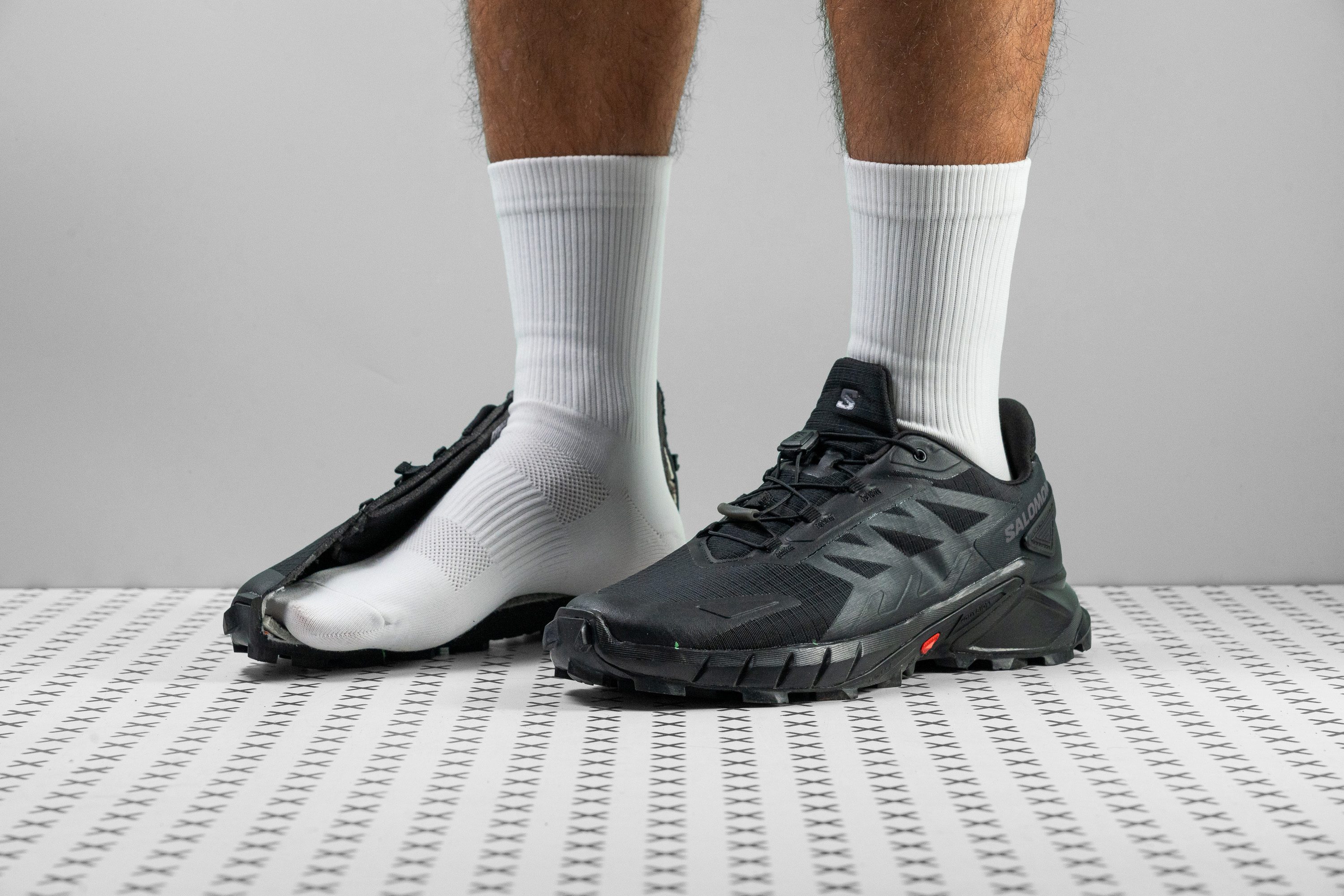Our verdict
Pros
- Excellent grip on diverse terrains like mud or snow
- Versatile for walking, hiking, and running
- Secure and comfortable fit with QuickLace system
- Compatible with custom insoles or OTC orthotics
- Tailored for heel strikers
- Brilliant on steep inclines due to effective lug design
- Nice durability
Cons
- Insufficient cushioning in the forefoot
- Stability issues in the heel area due to narrow design
- Potentially uncomfortable high drop
Audience verdict
Comparison
The most similar running shoes compared
+ + Add a shoe | |||||
|---|---|---|---|---|---|
| Audience score | 85 Good! | 81 Good! | 88 Great! | 89 Great! | |
| Price | £120 | £80 | £160 | £140 | |
| Trail terrain | ModerateTechnical | Light | ModerateTechnical | Technical | |
| Shock absorption | - | Moderate | Moderate | Low | |
| Energy return | - | Low | Moderate | Low | |
| Arch support | Neutral | Neutral | Neutral | Neutral | |
| Weight lab Weight brand | 11.1 oz / 315g 10.7 oz / 303g | 10.3 oz / 292g 10.4 oz / 296g | 10.3 oz / 293g 10.4 oz / 295g | 10.4 oz / 296g 10.5 oz / 298g | |
| Drop lab Drop brand | 15.2 mm 11.0 mm | 10.1 mm 8.0 mm | 7.2 mm 4.0 mm | 14.1 mm 10.0 mm | |
| Strike pattern | Heel | Heel | Mid/forefoot | Heel | |
| Size | True to size | True to size | True to size | True to size | |
| Midsole softness | Soft | Balanced | Soft | Firm | |
| Difference in midsole softness in cold | Small | Normal | Normal | Small | |
| Toebox durability | Good | Very bad | Good | Good | |
| Heel padding durability | Good | Bad | Good | Decent | |
| Outsole durability | Good | Decent | Good | Decent | |
| Breathability | Moderate | Moderate | Moderate | Warm | |
| Width / fit | Medium | Medium | Medium | Medium | |
| Toebox width | Narrow | Medium | Narrow | Medium | |
| Stiffness | Stiff | Flexible | Moderate | Moderate | |
| Torsional rigidity | Flexible | Stiff | Stiff | Stiff | |
| Heel counter stiffness | Flexible | Stiff | Flexible | Stiff | |
| Lug depth | 4.2 mm | 4.0 mm | 3.9 mm | 5.8 mm | |
| Heel stack lab Heel stack brand | 35.1 mm 32.0 mm | 37.7 mm 36.0 mm | 38.0 mm 33.0 mm | 36.5 mm 32.0 mm | |
| Forefoot lab Forefoot brand | 19.9 mm 21.0 mm | 27.6 mm 28.0 mm | 30.8 mm 29.0 mm | 22.4 mm 22.0 mm | |
| Widths available | Normal | Normal | Normal | NormalWide | |
| For heavy runners | ✗ | ✓ | ✗ | ✗ | |
| Season | All seasons | All seasons | All seasons | Winter | |
| Removable insole | ✓ | ✓ | ✓ | ✓ | |
| Orthotic friendly | ✓ | ✓ | ✓ | ✓ | |
| Ranking | #217 Bottom 43% | #307 Bottom 19% | #134 Top 35% | #103 Top 27% | |
| Popularity | #254 Bottom 33% | #232 Bottom 39% | #119 Top 32% | #72 Top 19% |
Who should buy
In our opinion, the Salomon Supercross 4 is an excellent choice for:
- Heel strikers who have a neutral gait and are in search of a trail shoe with a significant heel-to-toe drop.
- Loyal Salomon fans seeking a trail shoe with a softer midsole than most of their models.
- Outdoor enthusiasts who often run and sometimes hike in muddy or snowy conditions and need a shoe with reliable traction for these environments.
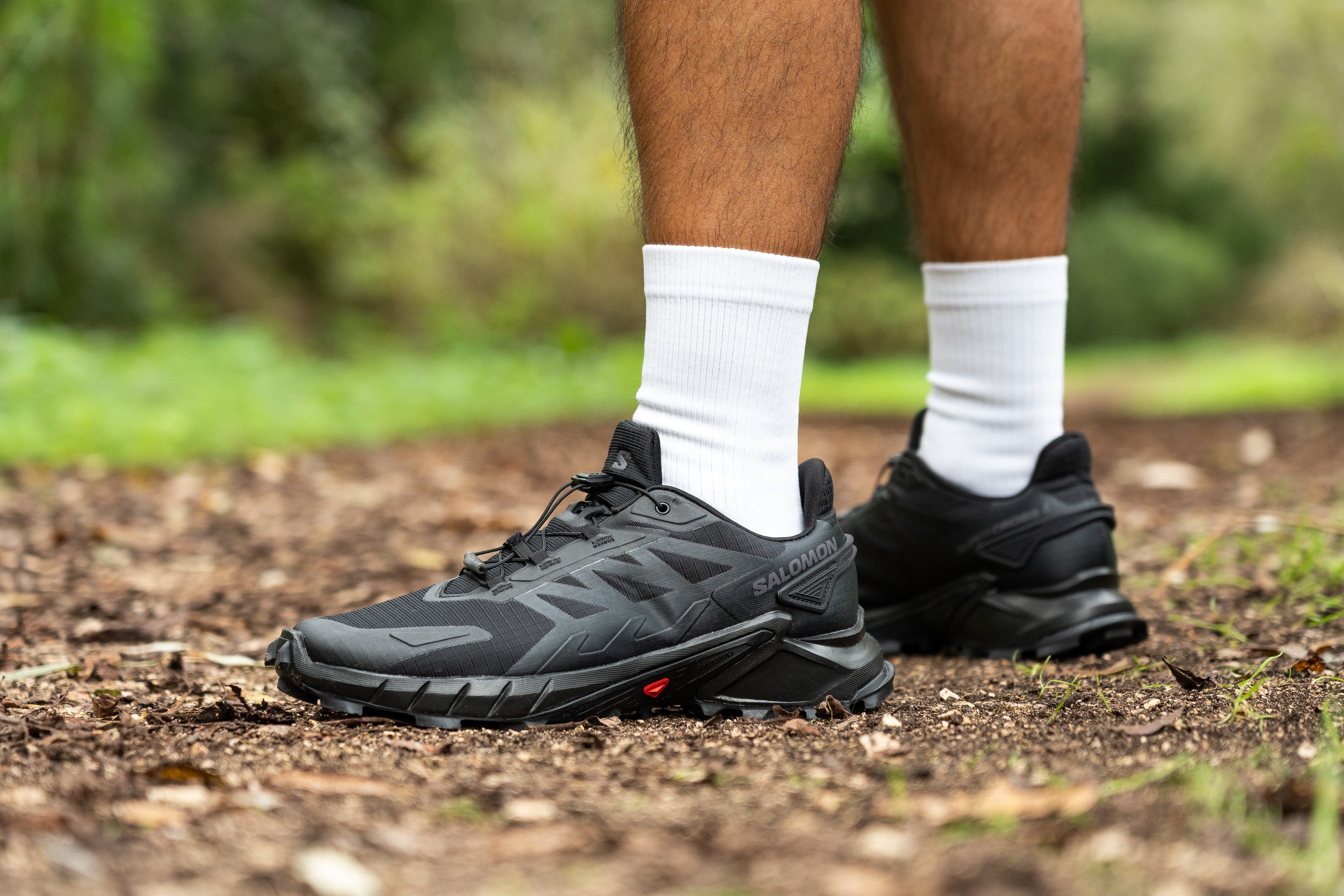
Who should NOT buy
We determined that the Salomon Supercross 4 might not be the ideal pick for heel strikers with stability concerns, mainly due to its extremely narrow heel.
For runners in this category, a trail shoe with a broader heel, like the Hoka Mafate Speed 4, could be a better option, especially since it also does a great job on technical terrain.
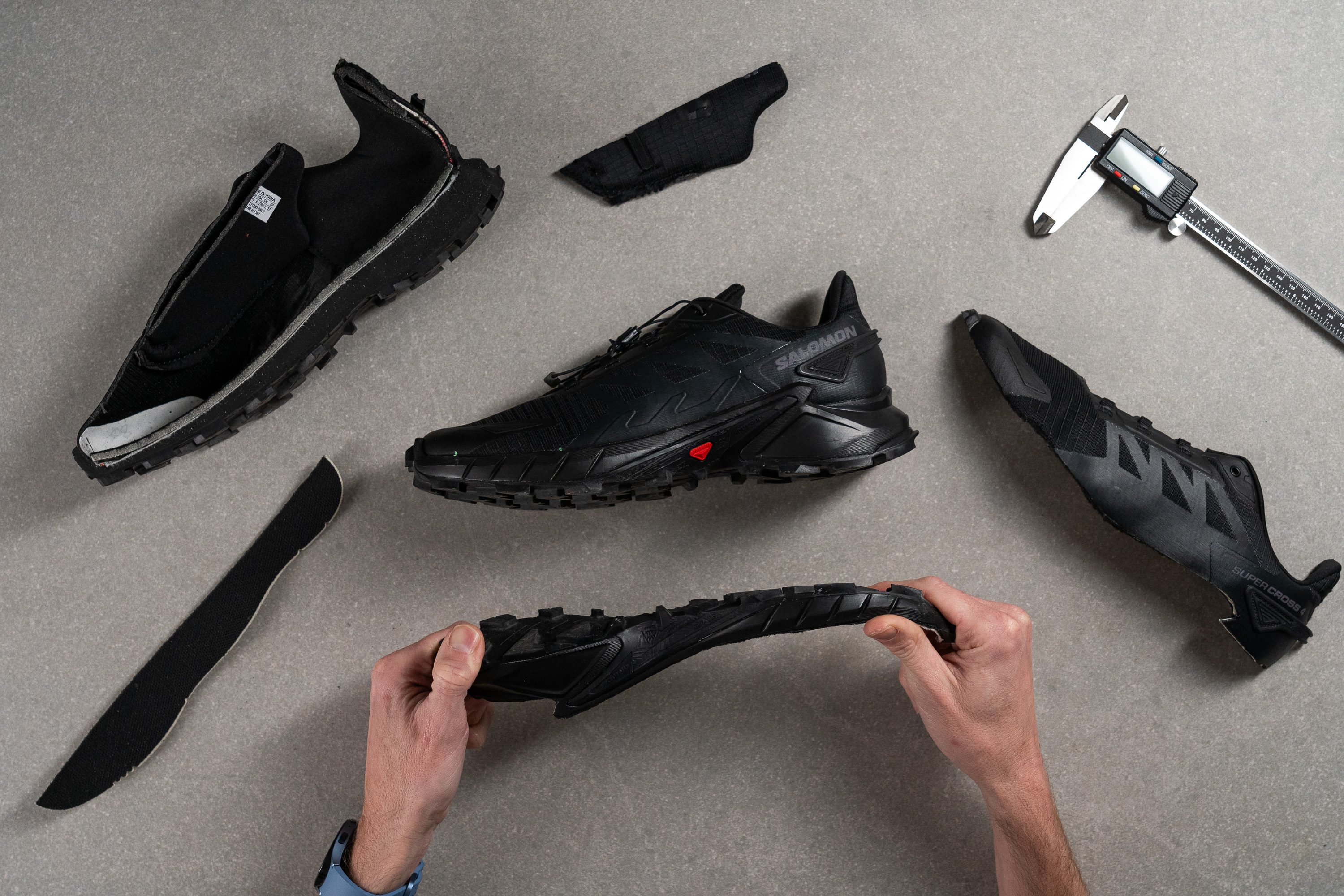
Furthermore, our analysis revealed that the Supercross 4 is not quite suited for midfoot and forefoot strikers. The shoe's forefoot area is quite thin, and it features a significantly high heel-to-toe drop. For those seeking a more balanced cushioning, we suggest considering the Saucony Peregrine 13.
Cushioning
Heel stack
In the heel, we measured a stack height of 35.1 mm, indicating an great amount of cushioning underfoot. This is particularly beneficial for heel strikers, who make up the majority of runners.
The generous cushioning ensures comfort and impact protection even during long runs but only if you strike the ground with the heel.
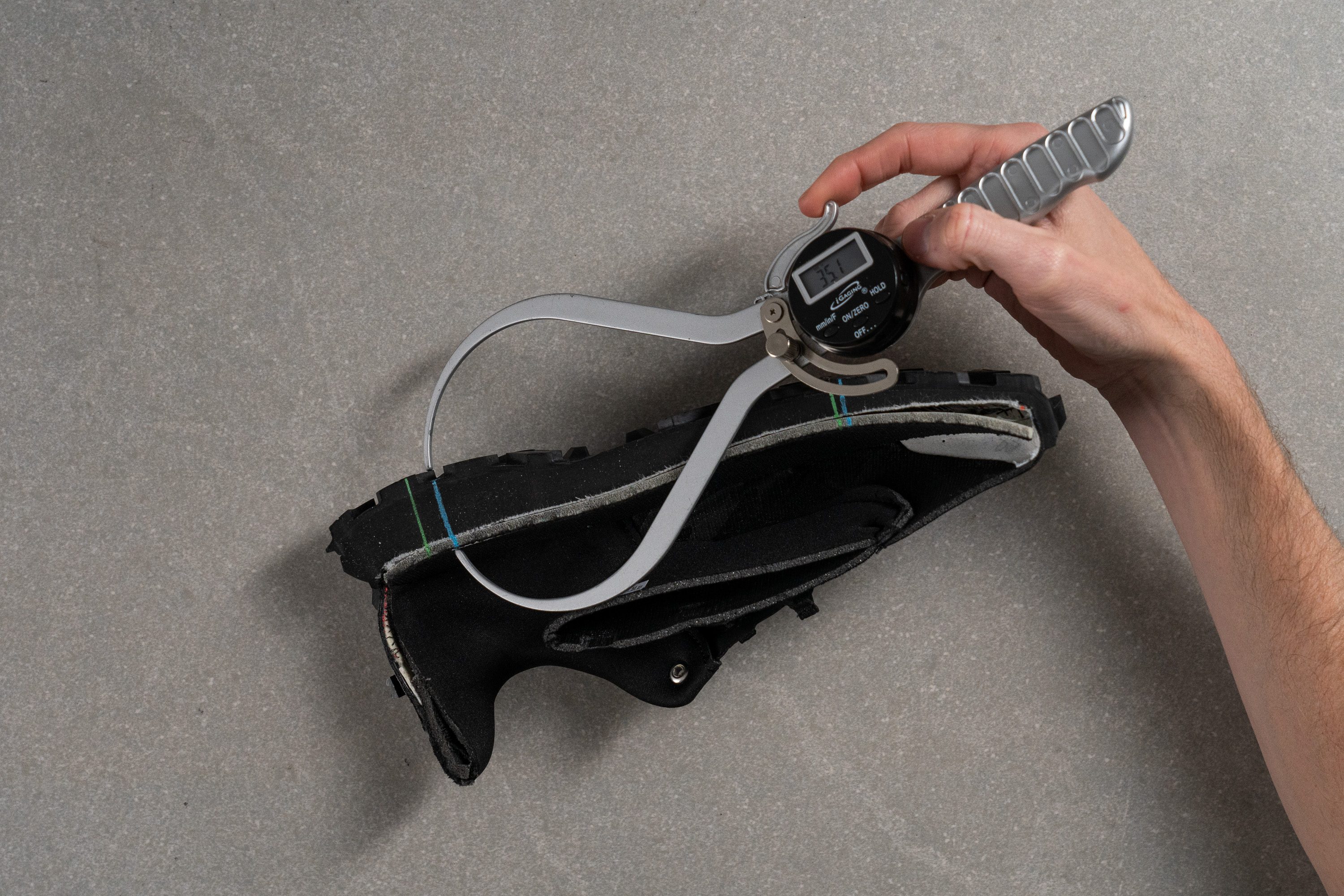
| Supercross 4 | 35.1 mm |
| Average | 32.6 mm |
Forefoot stack
However, the forefoot of the shoe is extremely thin. With a meagre thickness of only 19.9 mm, it falls short for long-distance running, especially for forefoot or midfoot strikers.
The thick outsole further compounds the issue by leaving very little foam for cushioning, as you can see in the picture below.
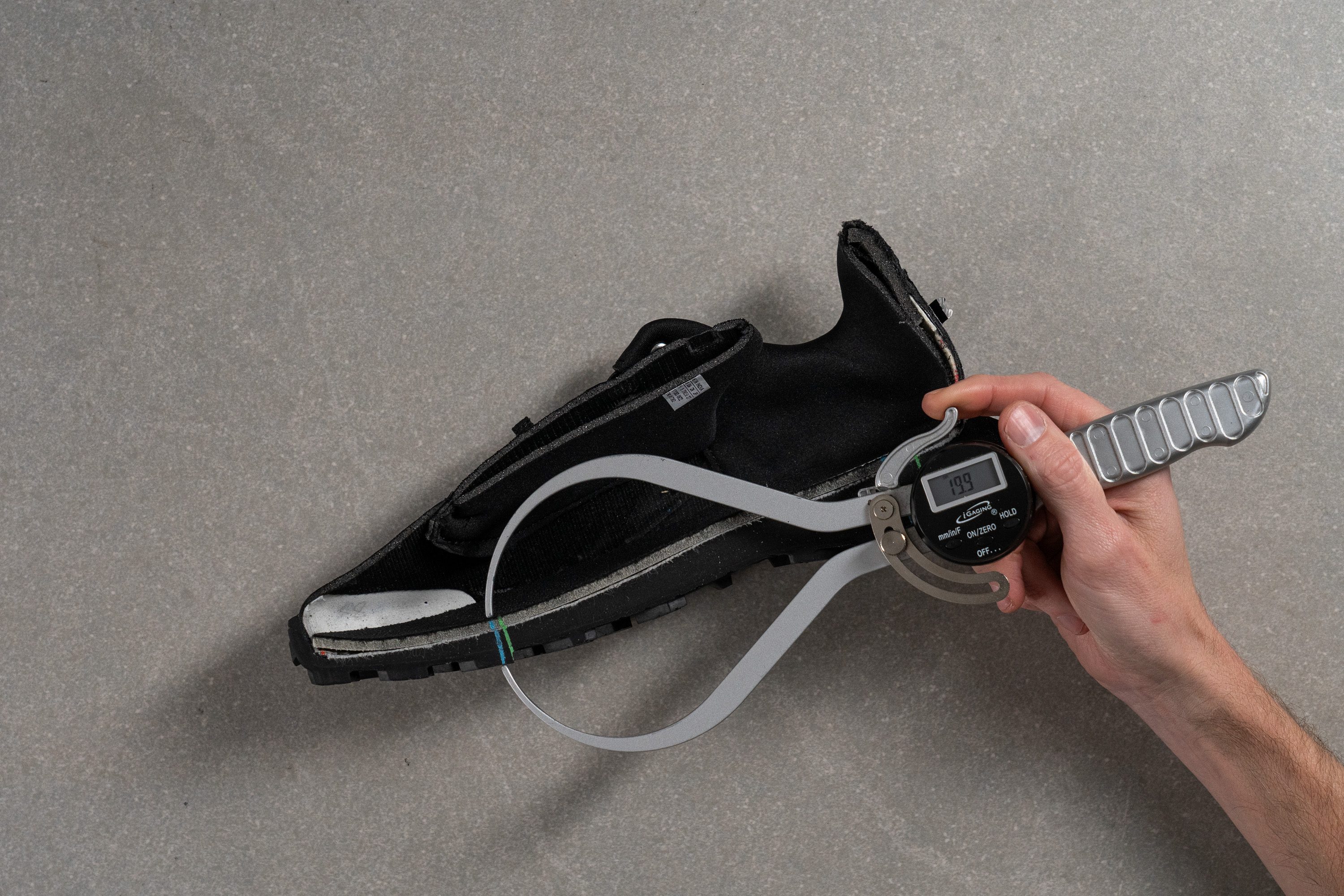
| Supercross 4 | 19.9 mm |
| Average | 25.1 mm |
Drop
As you might have inferred from our earlier measurements, the heel-to-toe drop in this wedge-shaped shoe is BRUTAL.
With a staggering offset of 15.2 mm, it ranks as one of the most pronounced we've encountered in the lab.
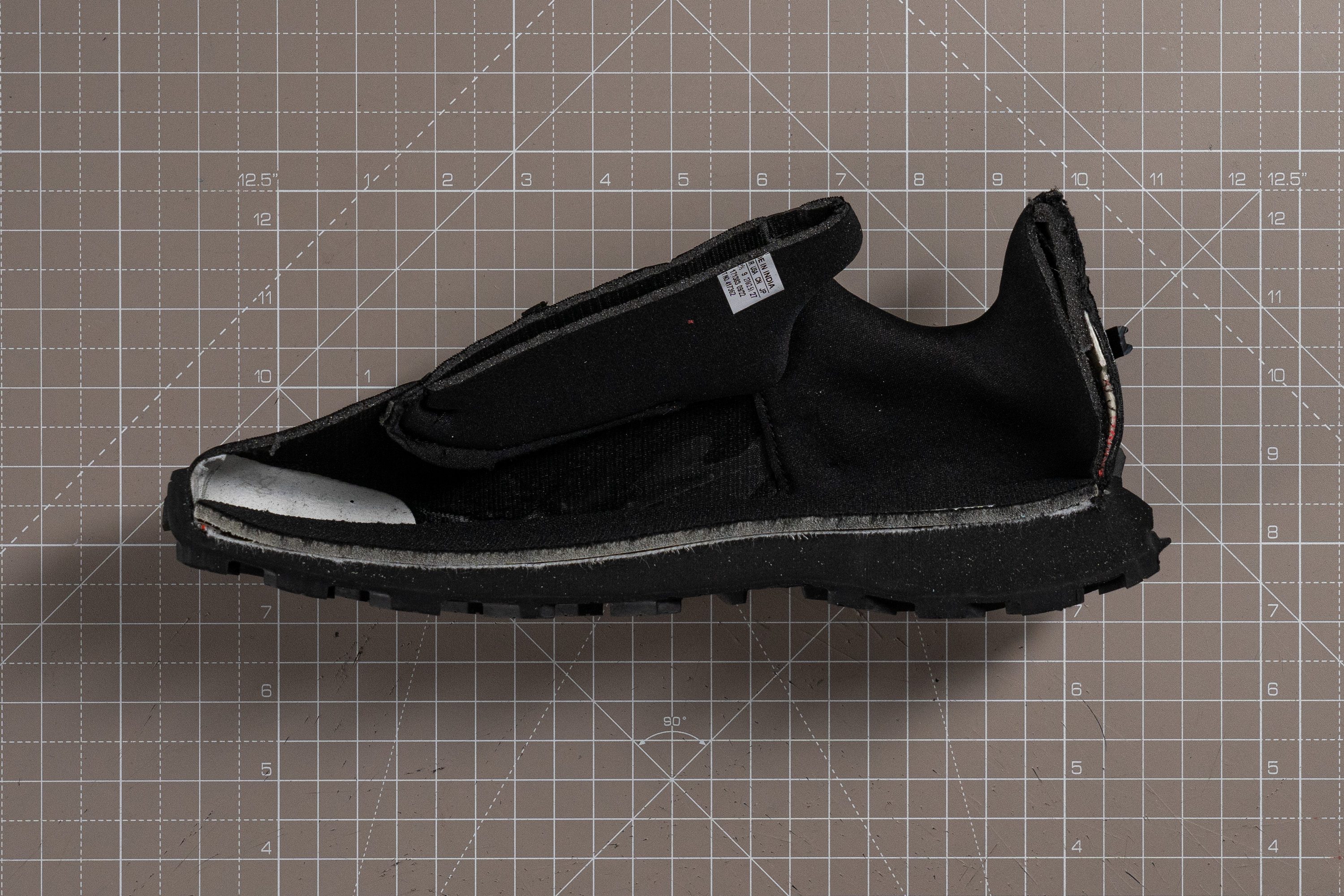
| Supercross 4 | 15.2 mm |
| Average | 7.6 mm |
Midsole softness
Salomon typically caters to fans of firm midsoles, so our durometer reading of 19.3 HA taken directly on the EnergyCell foam was a surprise in the lab.
It indicates a more balanced midsole—neither plush and cloud-like nor overly firm. Expect a ride that strikes a comfortable middle ground.
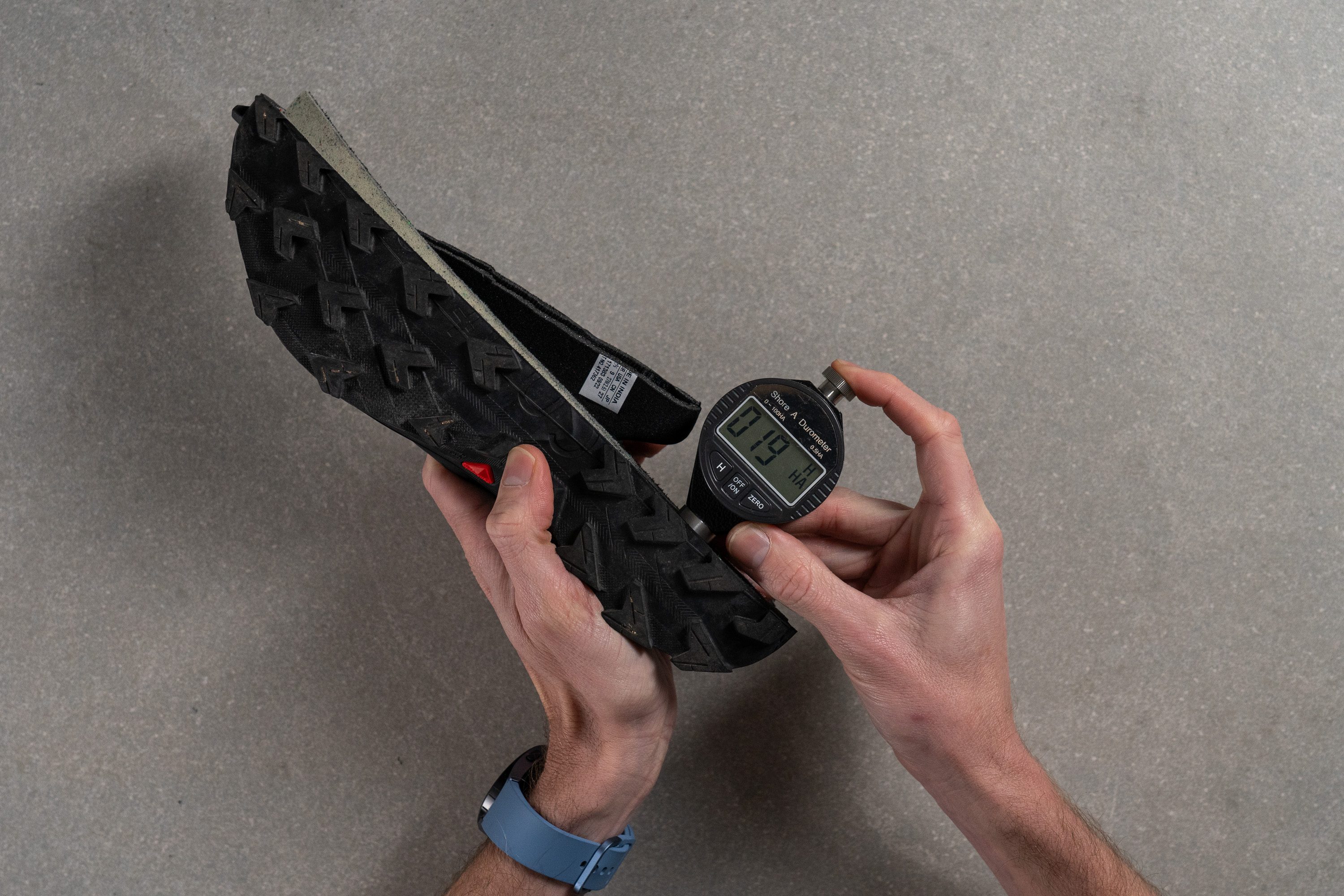
| Supercross 4 | 19.3 HA |
| Average | 22.0 HA |
Size and fit
Size
Salomon Supercross 4 fits true to size (22 votes).
Internal length
| Supercross 4 | 273.6 mm |
| Average | 269.0 mm |
Width / Fit
Salomon, famous for its snug-fitting, performance-focused uppers, led us to expect a narrower fit.
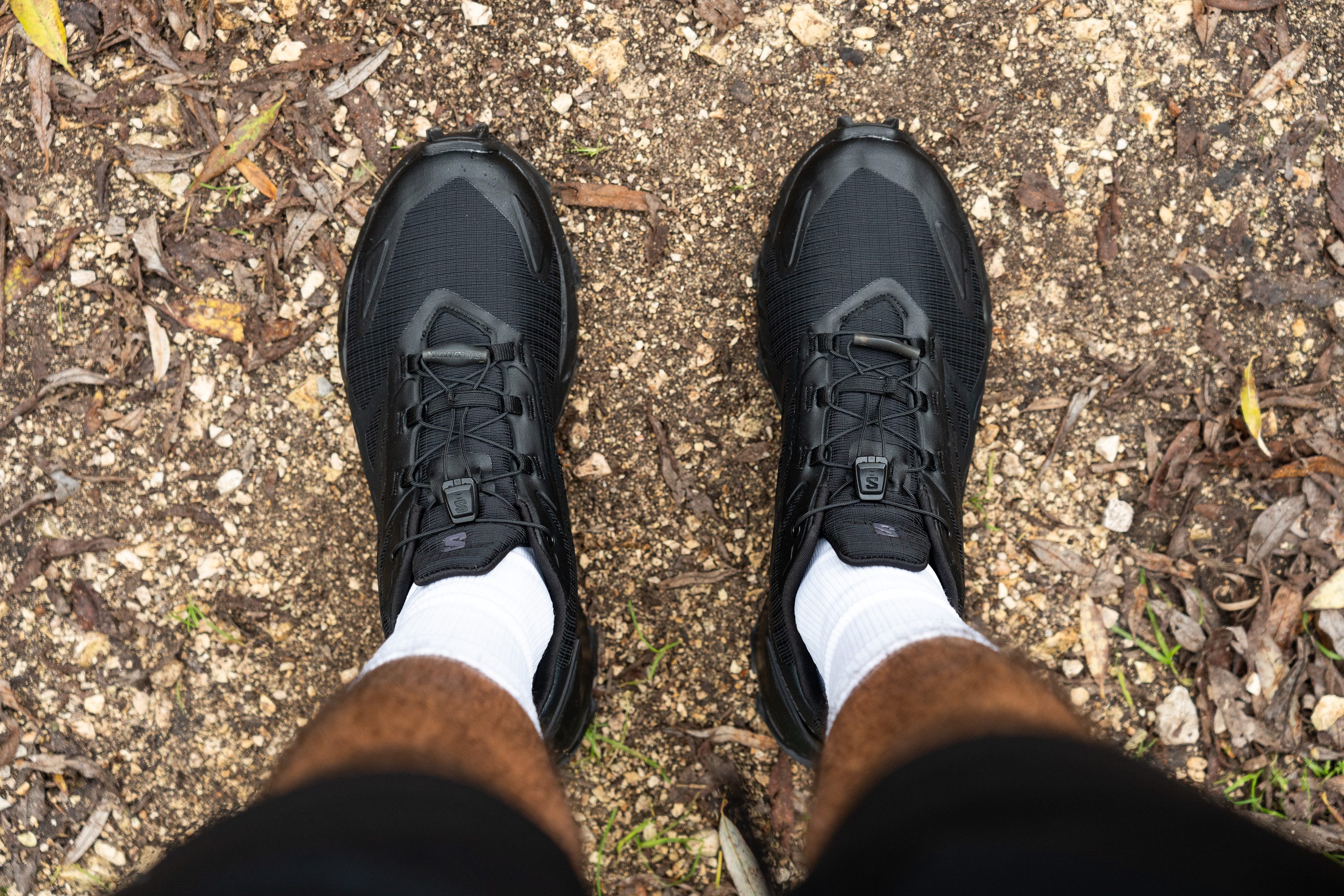
However, measuring a generous 99.5 mm in the widest part of the toebox, the Supercross 4 pleasantly surprised us with its unexpectedly spacious design.
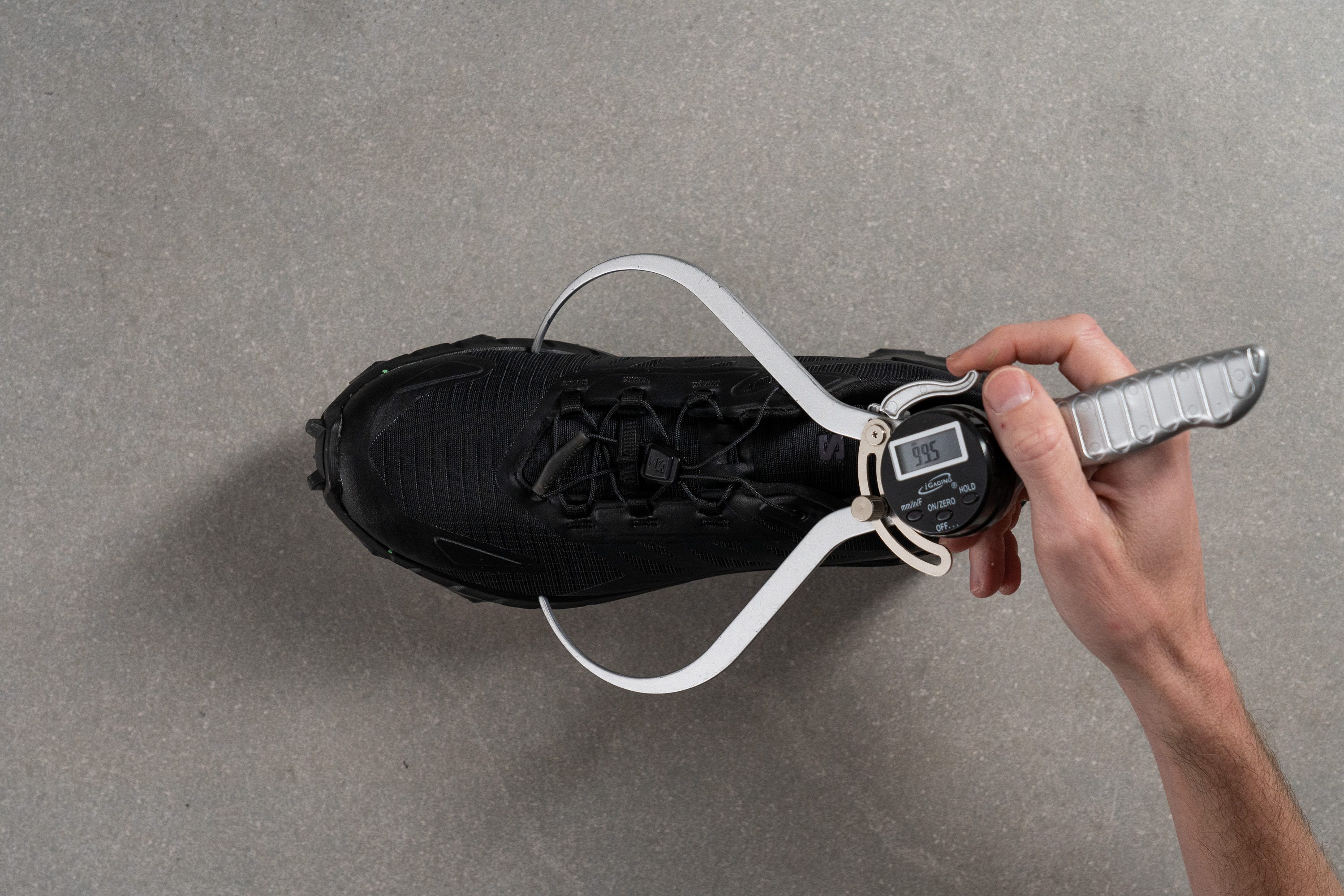
This test follows an older methodology, which is why you don't see recently tested shoes in the chart. Results from different methodologies can not be compared.
| Supercross 4 | 99.5 mm |
| Average | 98.9 mm |
Toebox width
When we checked the big toe area of the shoe, we encountered a disappointment. The measurement came to just 71.2 mm, which means there's not much space for your toes to move freely.
If having plenty of room for toe splay is important to you, we recommend considering other options, such as the New Balance Fresh Foam X Hierro V7.
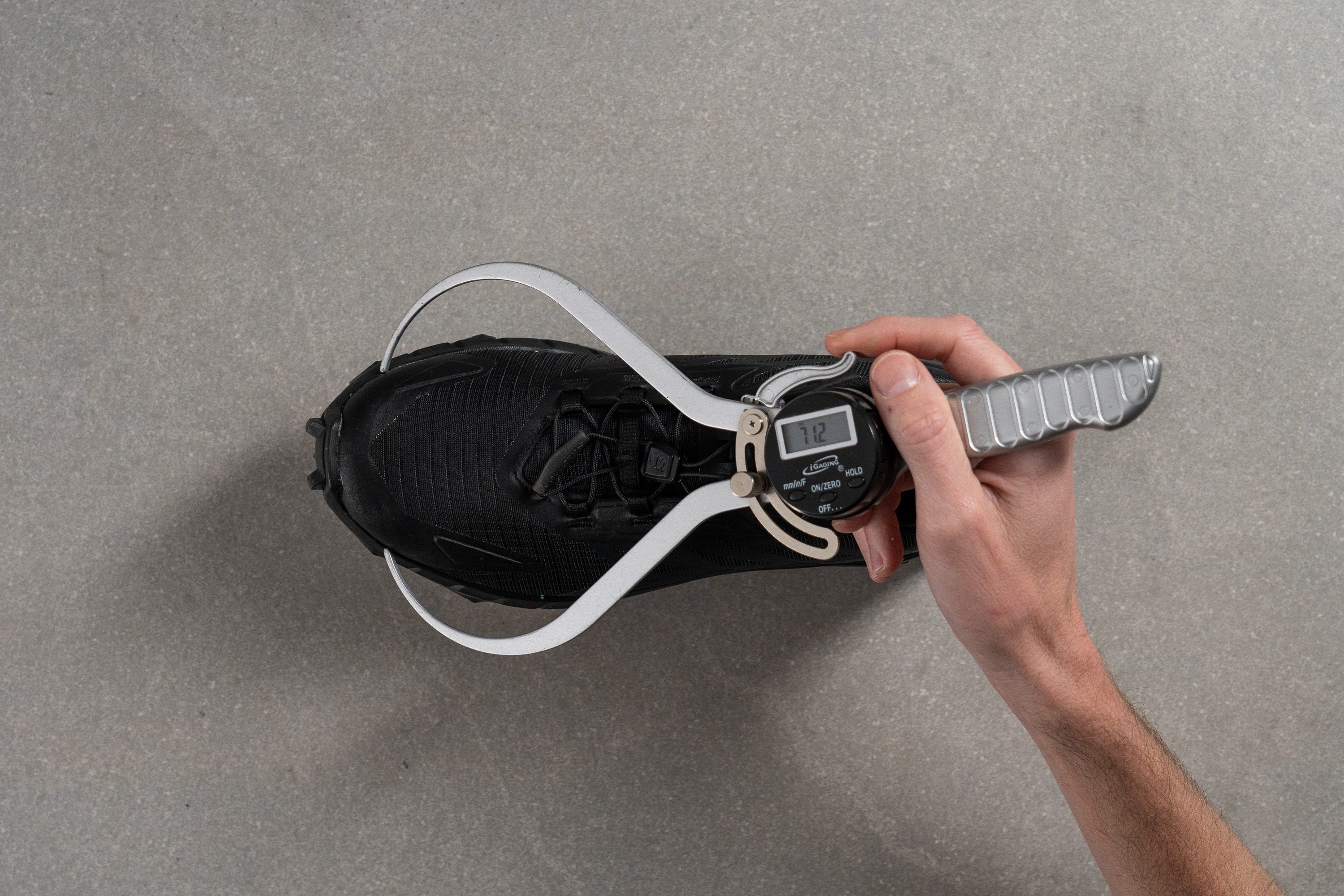
This test follows an older methodology, which is why you don't see recently tested shoes in the chart. Results from different methodologies can not be compared.
| Supercross 4 | 71.2 mm |
| Average | 79.3 mm |
Traction / Grip
Lug depth
Designed for technical trails and steep descents on loose terrain, the 4.2-mm lug depth of the Supercross 4 seems the right choice. While it might struggle slightly in the toughest mud and snow conditions, this outsole works great in most scenarios.
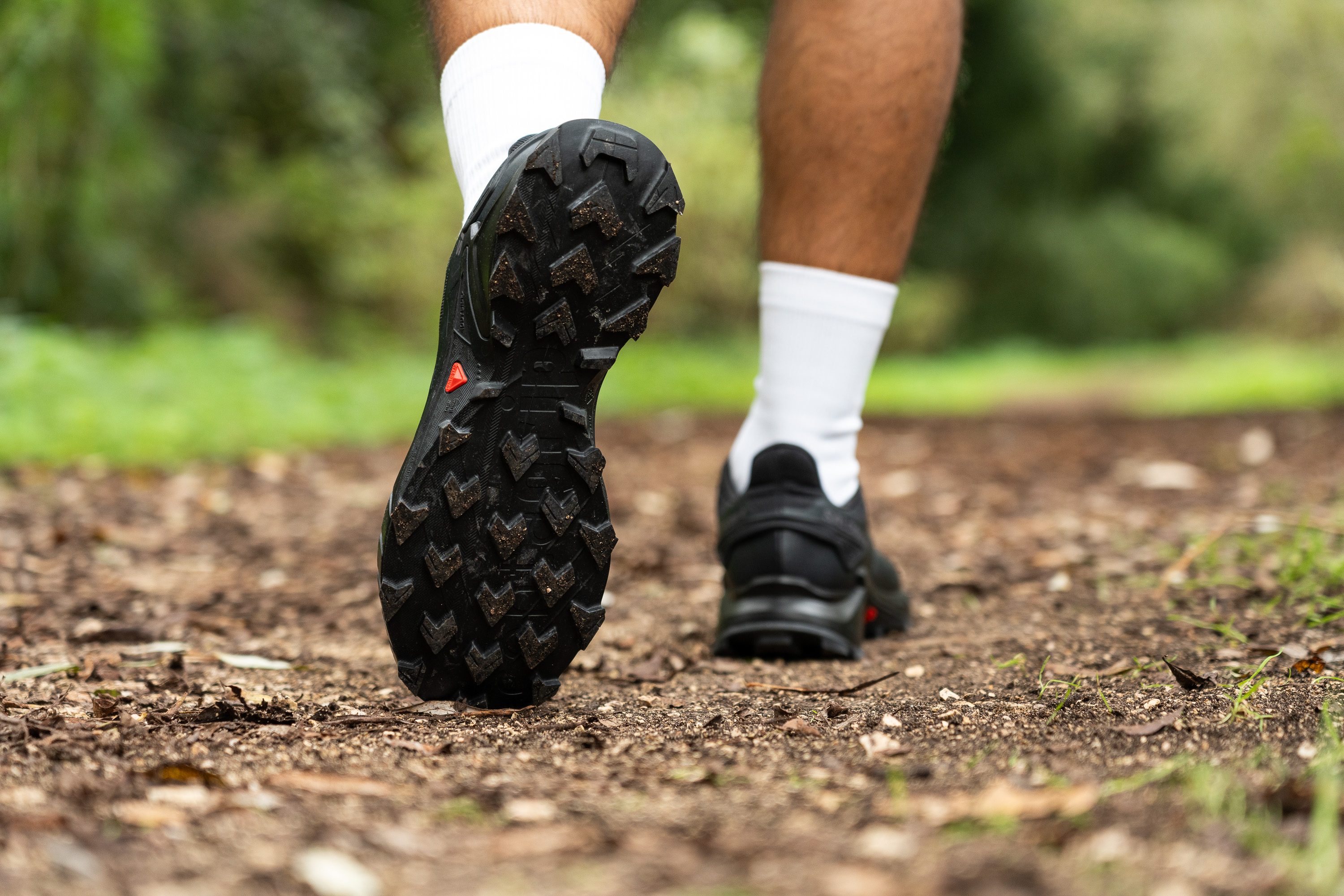
Most of the Contagrip outsole's lugs are chevron-shaped and strategically positioned for enhanced traction, truly make a difference.
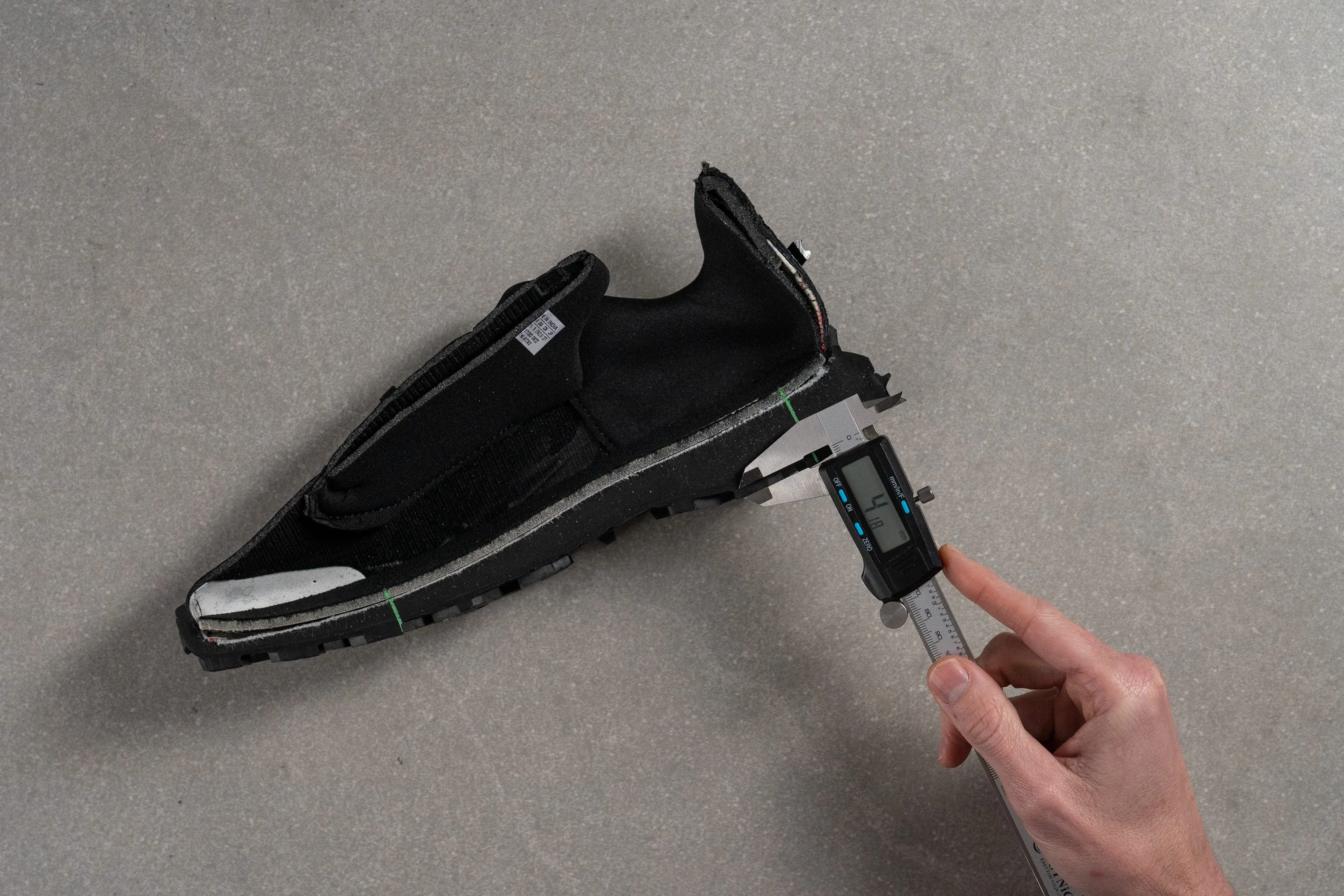
| Supercross 4 | 4.2 mm |
| Average | 3.5 mm |
Flexibility / Stiffness
In our longitudinal flexibility test, which involves bending the shoe to a 90-degree angle, we discovered that just 17.5N of force was required to reach the desired point.
This low score signals the shoe's exceptional flexibility, making it extremely comfortable for both walking and hiking. And its impressive flexibility in all directions can be largely attributed to the absence of a rock plate.
This test follows an older methodology, which is why you don't see recently tested shoes in the chart. Results from different methodologies can not be compared.
| Supercross 4 | 17.5N |
| Average | 27.1N |
Stiffness in cold
We did the same experiment as with the cushioning—20 minutes at freezing temps and then re-measured the shoe. This time, the stiffness test delivered a 21.5N result.
| Supercross 4 | 21.5N |
| Average | 35.9N |
Stiffness in cold (%)
That's just a 22.9% increase, an impressive achievement for this midsole ensuring that, regardless of the cold weather out there, the Supercross 4 won't feel like a brick underfoot.
| Supercross 4 | 23% |
| Average | 32% |
Weight
We found that the Salomon Supercross 4 disappointingly tips the scales at a hefty 11.1 oz (315g), making it far from a lightweight option.
Surprisingly, it's even heavier than its big sibling, the Speedcross 6, despite having less foam underfoot. This added weight could be a drawback for those seeking an agile trail running experience.
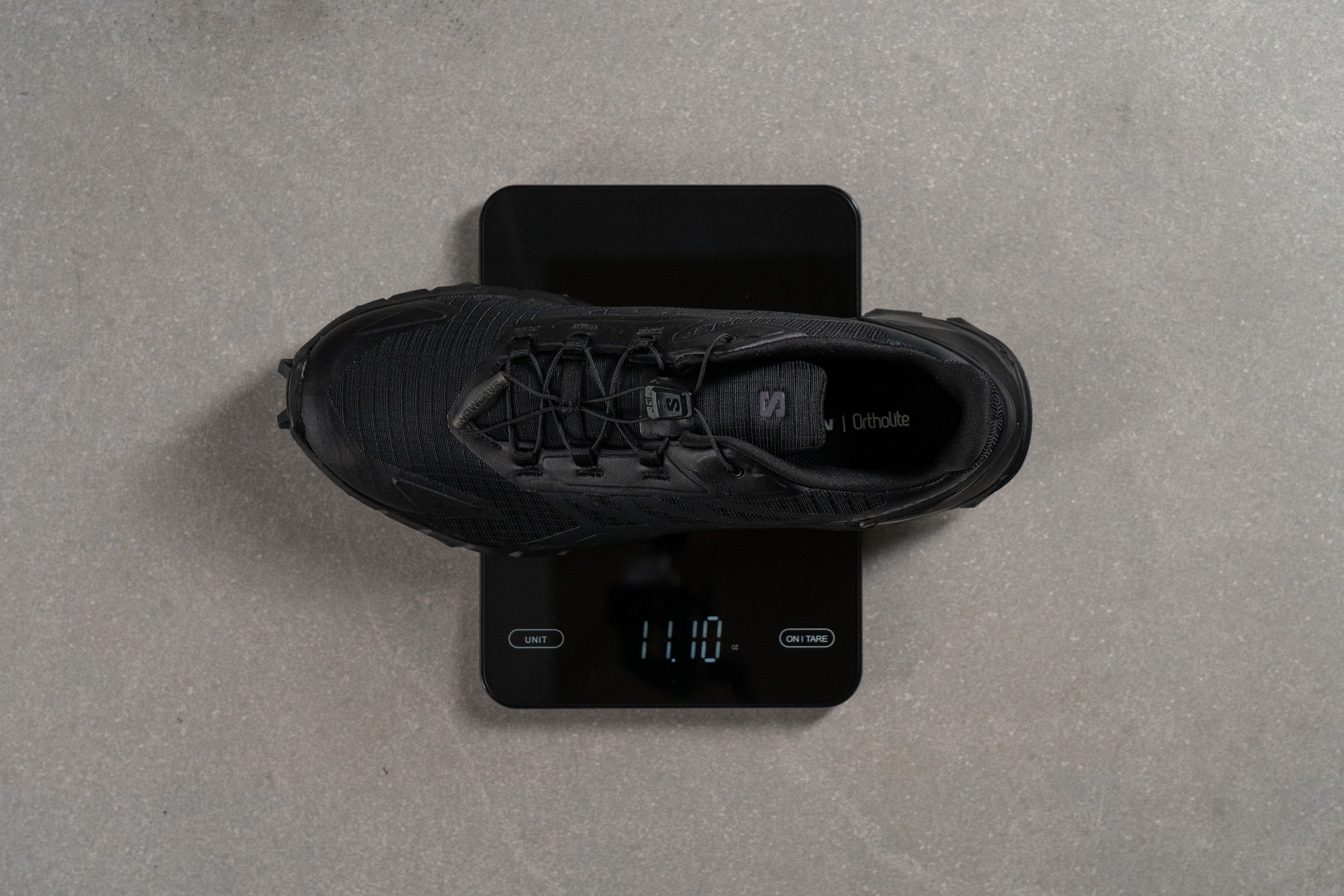
| Supercross 4 | 11.1 oz (315g) |
| Average | 10.2 oz (289g) |
Breathability
The Supercross 4's upper initially didn't seem promising in terms of breathability due to its lack of visible ventilation holes. This set our expectations quite low as we began our lab testing.
However, the shoe managed to deliver a surprise during our smoke test, scoring a respectable 3 out of 5. This was a notably better result than we had anticipated, hinting at some breathability potential despite the initial impression.
In the next phase of our assessment, we moved to examining the shoe under a strong light. Although the shoe lacks big ventilation holes, we observed some extra-small glimpses of light passing through it.
This indicated that some air could make its way through the upper, which explained the average-at-best breathability score we observed in the smoke test.
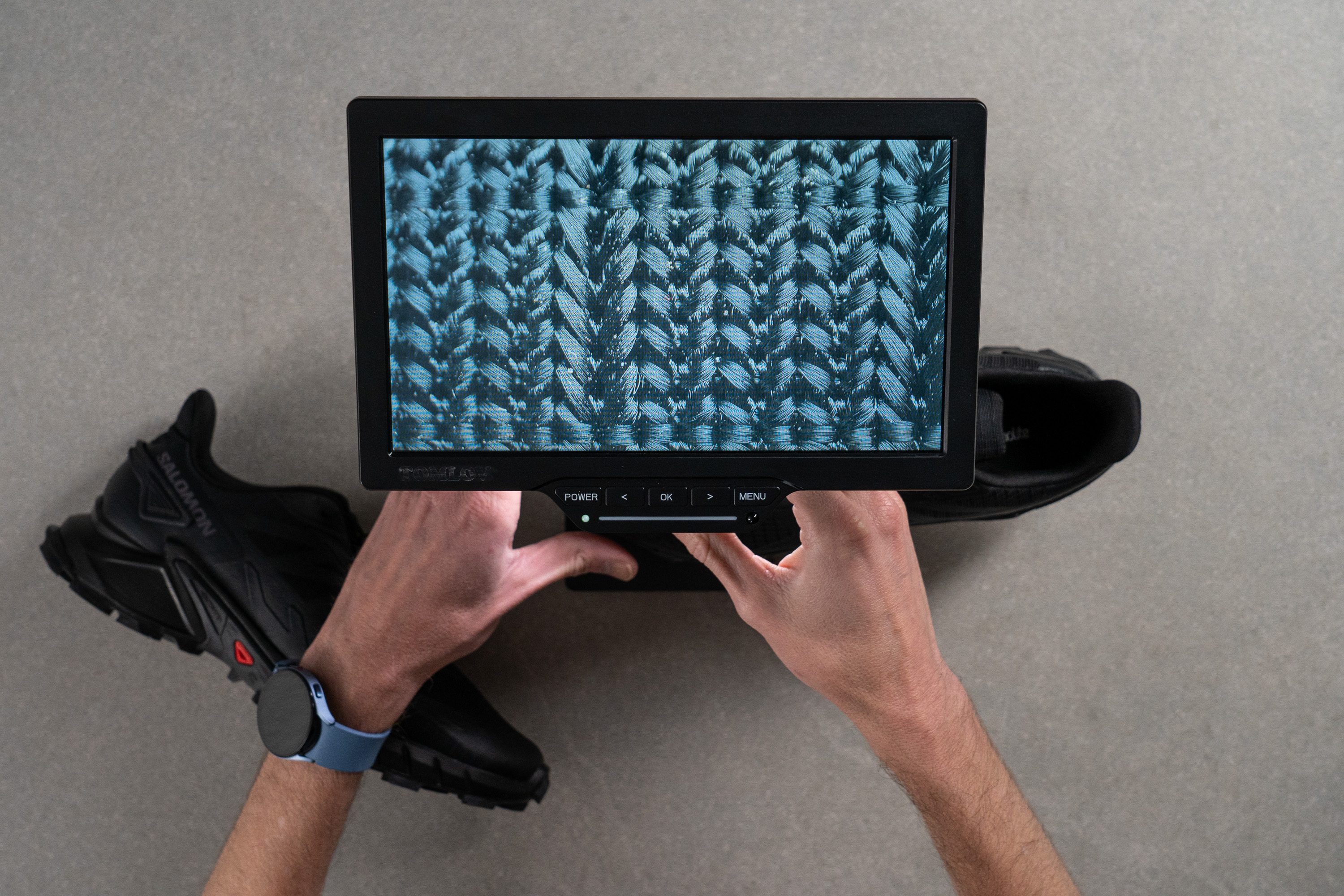
To delve deeper into the upper's structure, we turned to the microscope for a closer inspection.
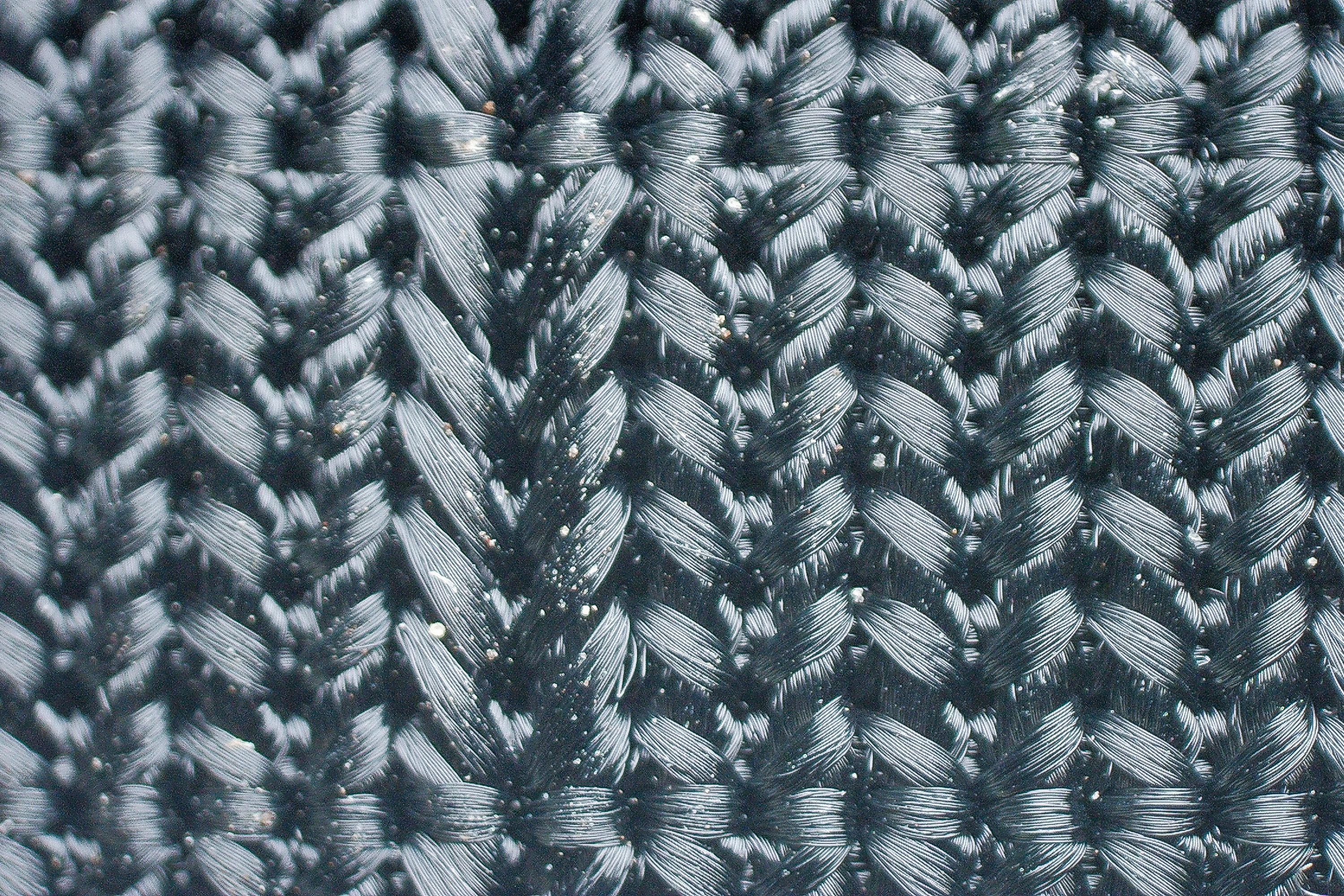
Here, we discovered an ultra-thin mesh characterised by tiny gaps. These gaps were the pathways for air to escape, but their minuscule size was so limiting that they were barely visible even under microscopic examination.
Our final step involved a manual check of the mesh for elasticity. This would help us understand if breathability might improve with use as the material stretched. However, we found no elasticity in the mesh, leading to the conclusion that the breathability of the Supercross 4 is unlikely to increase over time.
| Supercross 4 | 3 |
| Average | 3.3 |
Stability
Lateral stability test
The Supercross 4 doesn't primarily focus on stability, so it's best not to anticipate a supportive ride.
That said, we found its performance satisfactory in multiple terrains, particularly in forefoot landings, though it was less impressive in the heel.
Torsional rigidity
Upon testing the torsional rigidity by twisting the shoe, we discovered it was surprisingly flexible!
Scoring just a 2/5 on our scale, this flexibility enhances comfort and proves advantageous when going through tight corners.
| Supercross 4 | 2 |
| Average | 3.6 |
Heel counter stiffness
The heel counter also exhibits considerable flexibility, contributing to the shoe's less stable feel in the rearfoot area. We assigned it a similar flexibility rating of 2/5.
| Supercross 4 | 2 |
| Average | 3 |
Midsole width - forefoot
When we first unboxed the shoe in the lab, it was evident that it followed Salomon's classic narrow design. To confirm this, we took ultra-precise measurements in the lab.
The maximum width of the forefoot measured 112.5 mm, aligning with the average width for trail running shoes.
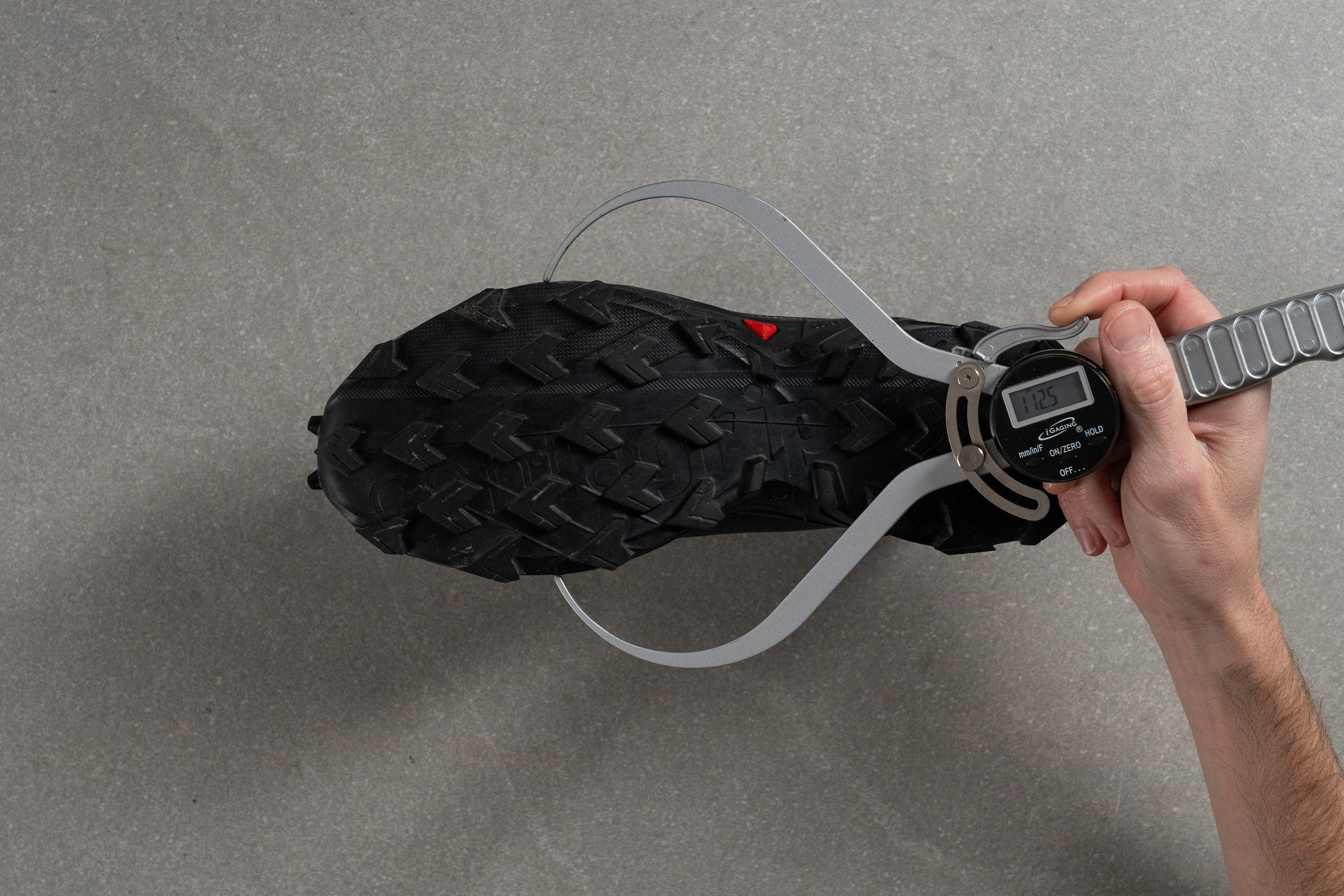
| Supercross 4 | 112.5 mm |
| Average | 112.8 mm |
Midsole width - heel
Despite its purpose for blazing-fast cornering, at just 85.7 mm, the heel is very narrow and compromises its stability.
This design choice seems really weird with the substantial heel-to-toe drop of this shoe, which targets heel strikers.
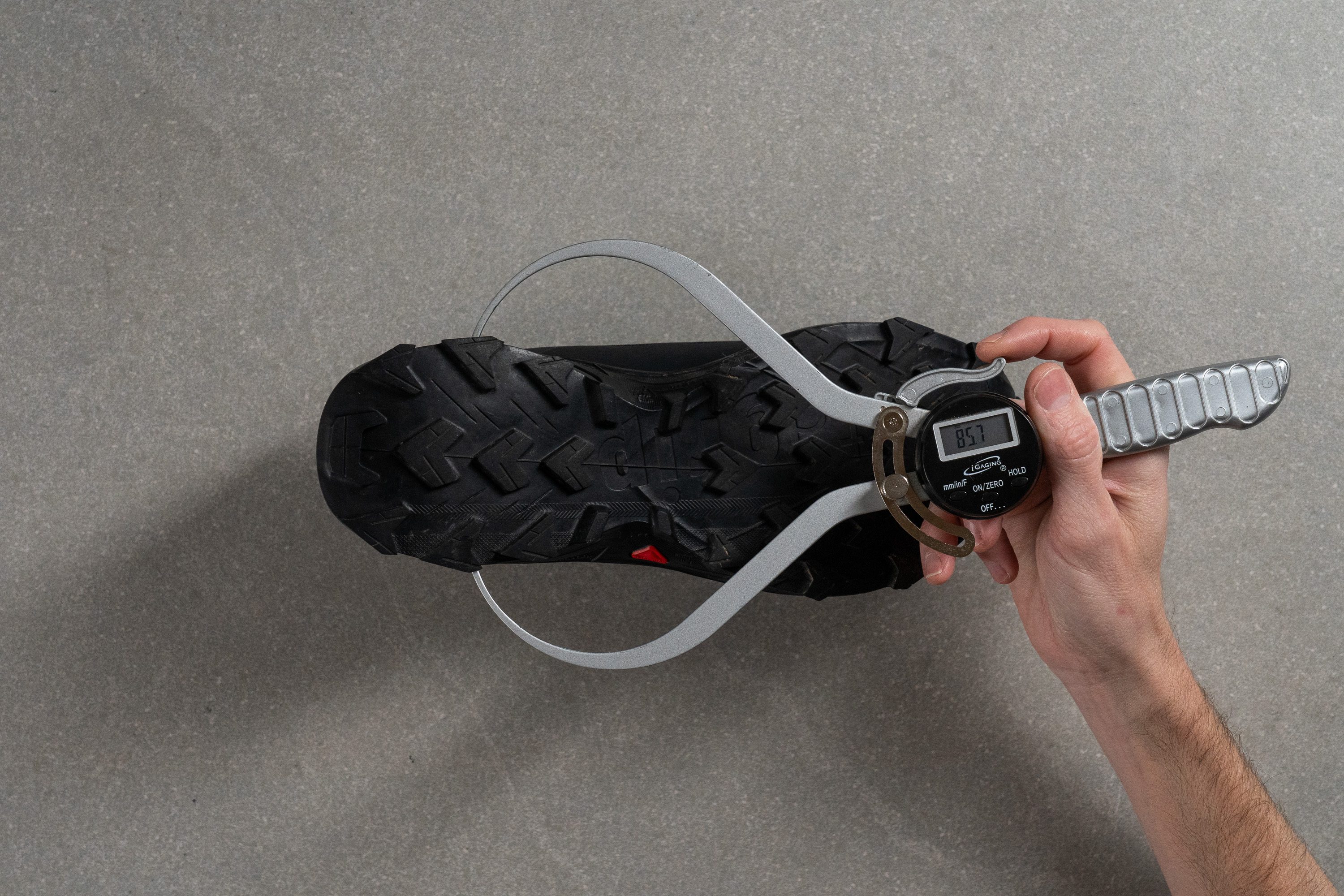
| Supercross 4 | 85.7 mm |
| Average | 89.9 mm |
Durability
Toebox durability
With shoes that typically have subpar durability, we often hope for better results, so we eagerly fired up the Dremel for our rigorous test.
Fortunately, the Salomon exceeded our expectations thanks to its protective layer, impressively earning a 4 out of 5 in this challenging test. This remarkable performance places the shoe among the most durable we've ever evaluated in our lab.
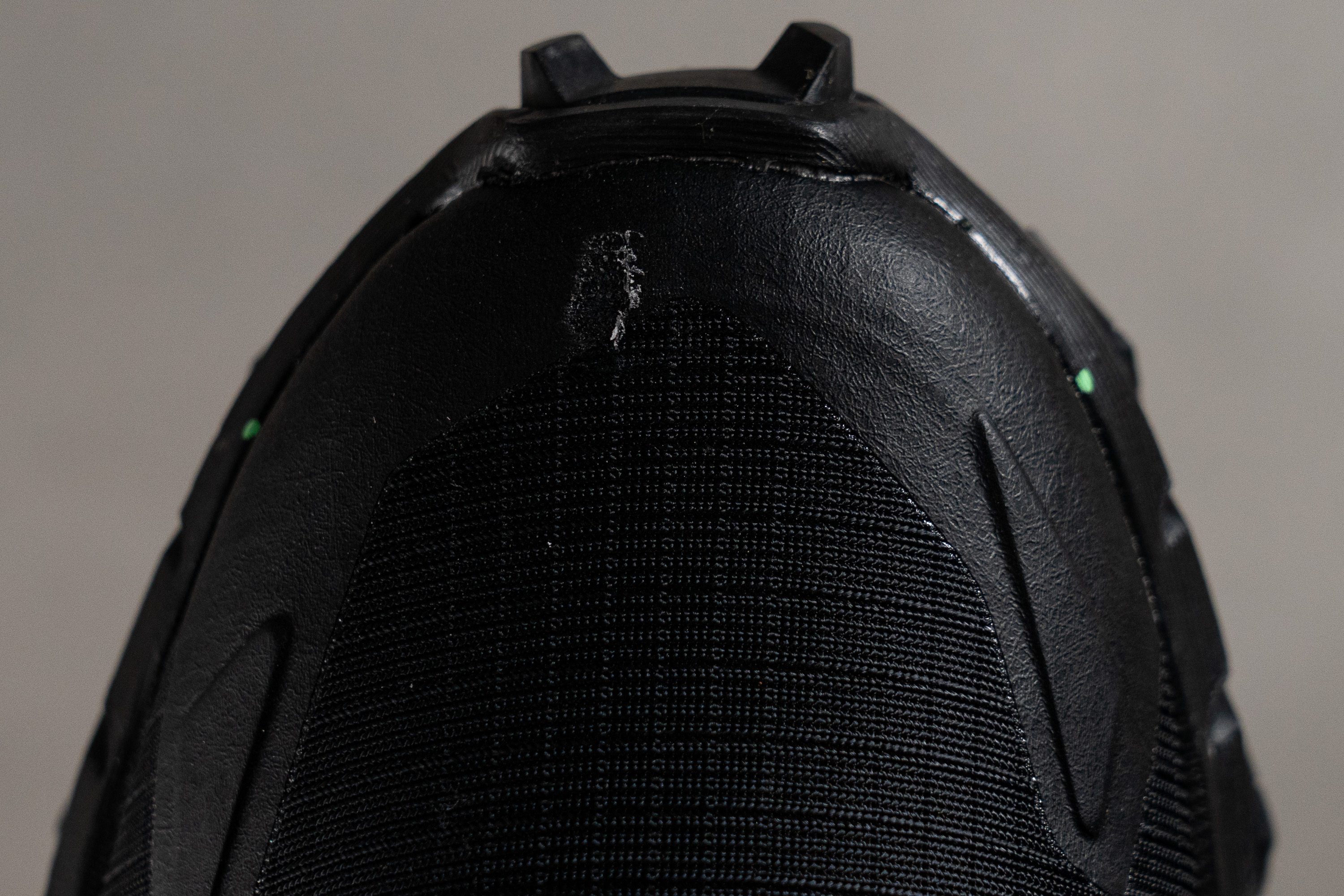
| Supercross 4 | 4 |
| Average | 3.1 |
Heel padding durability
But hold on, because the shoe continues to impress in the durability department. It's not just good in the toebox, but also excels in the heel area.
When we subjected the heel to our back-to-back Dremel test, the results in our lab were unanimous—a perfect 5 out of 5. This performance makes the Supercross 4 a standout choice for those who value long-lasting wear in this area.
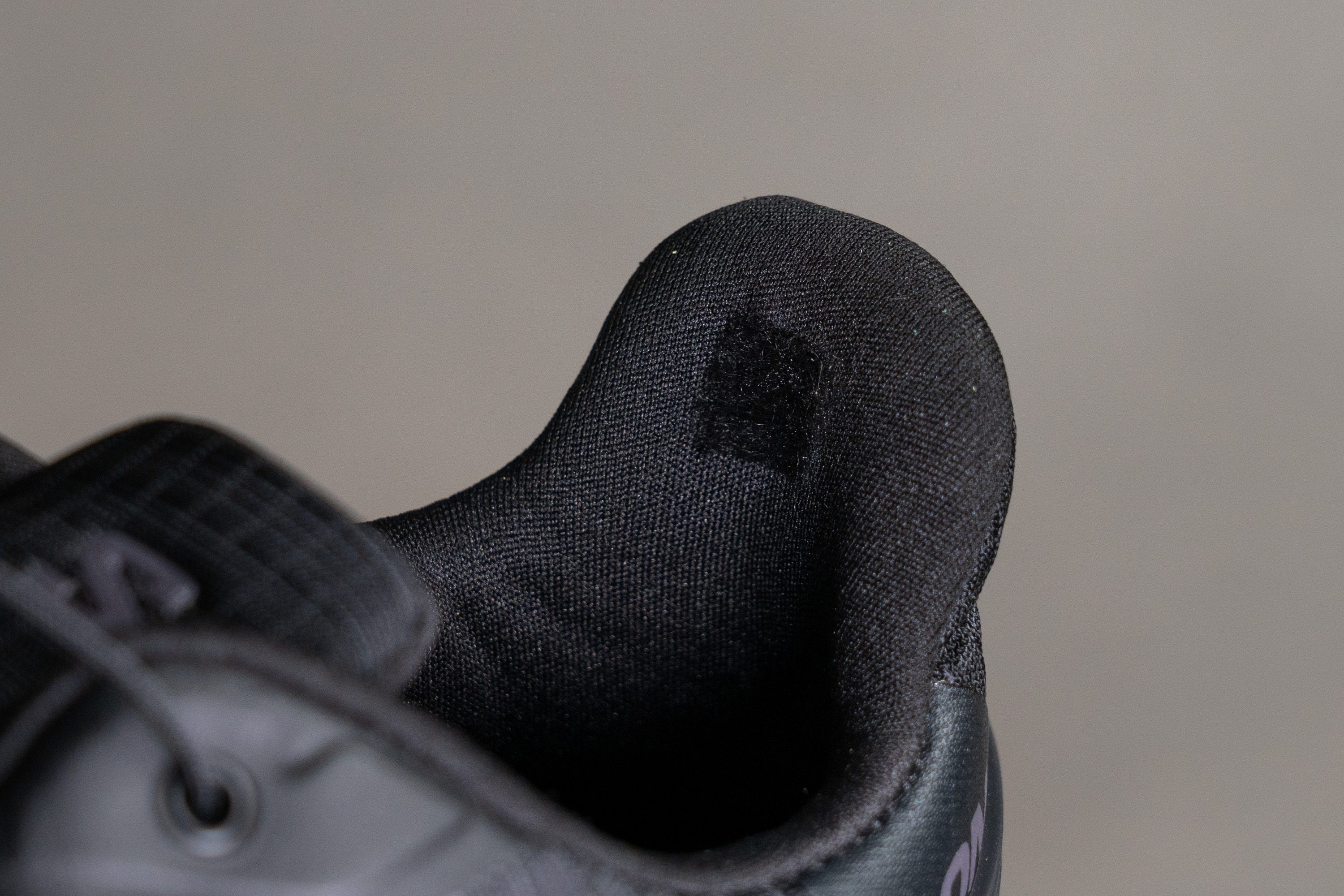
| Supercross 4 | 5 |
| Average | 3 |
Outsole hardness
Shifting our focus to the outsole, we were keen to see if Salomon also mastered durability with its Contagrip rubber.
Our first step was to assess the rubber's hardness. The result was a fairly average 86.0 HC.
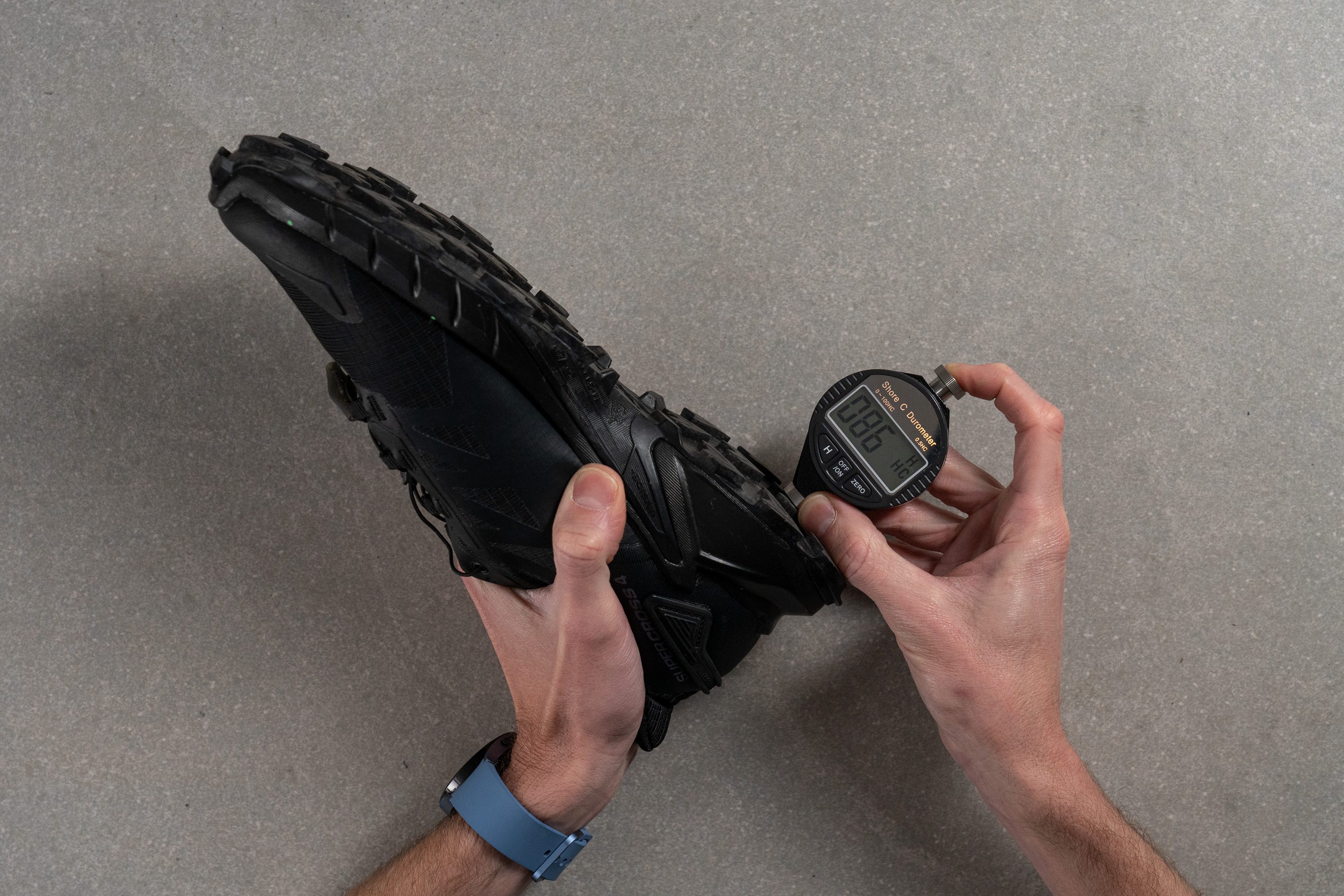
| Supercross 4 | 86.0 HC |
| Average | 85.8 HC |
Outsole durability
For the last durability test, we brought out our Dremel for the third round.
The outcome was a mere 0.7-mm indentation on the lug, once again demonstrating exceptional durability!
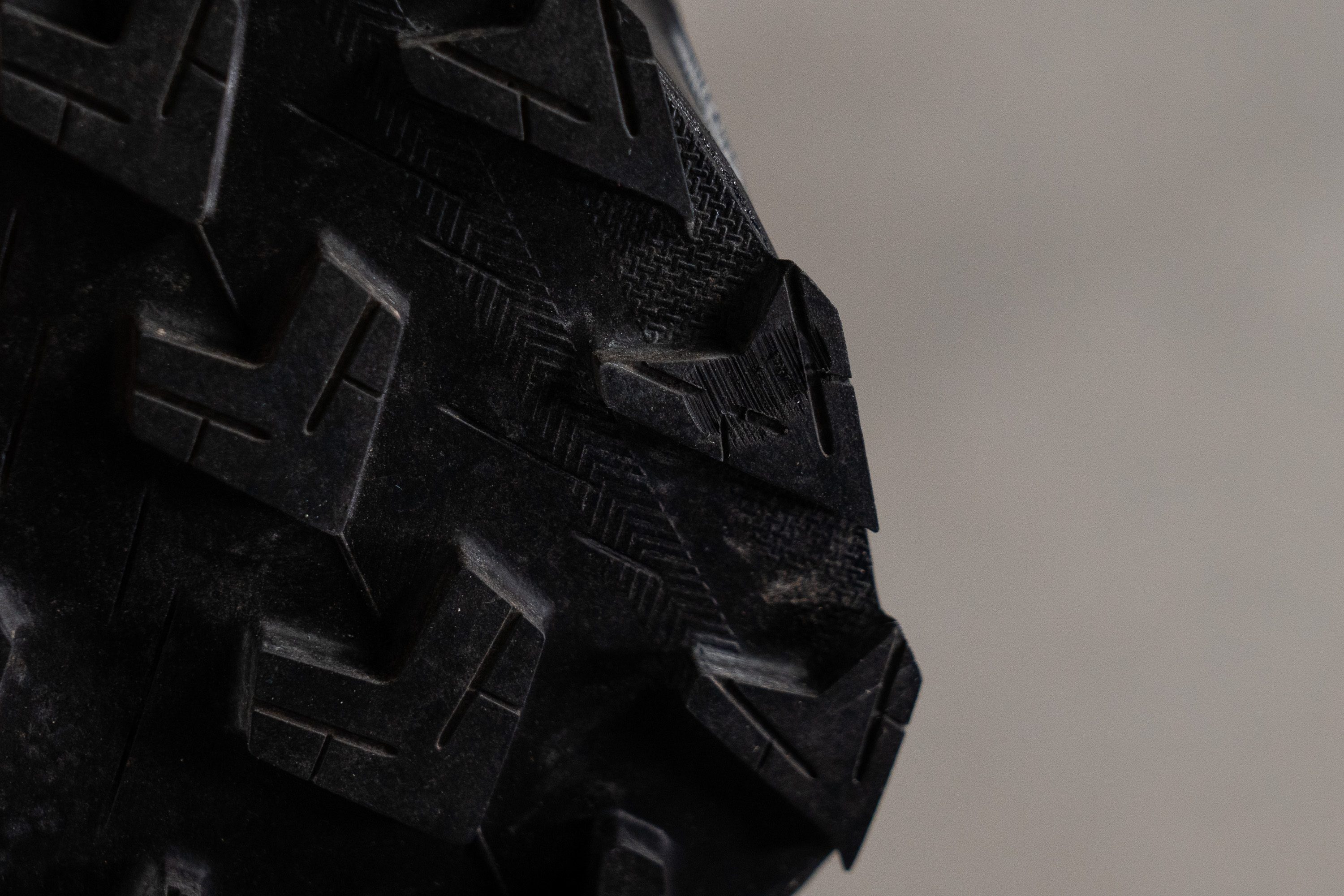
| Supercross 4 | 0.7 mm |
| Average | 0.9 mm |
Outsole thickness
With an impressive 2.5-mm thickness in the outsole, you can be absolutely assured that if you ever switch from these shoes, it won't be due to wear and tear in this area.
The robust Contagrip rubber guarantees long-lasting performance across all terrains.
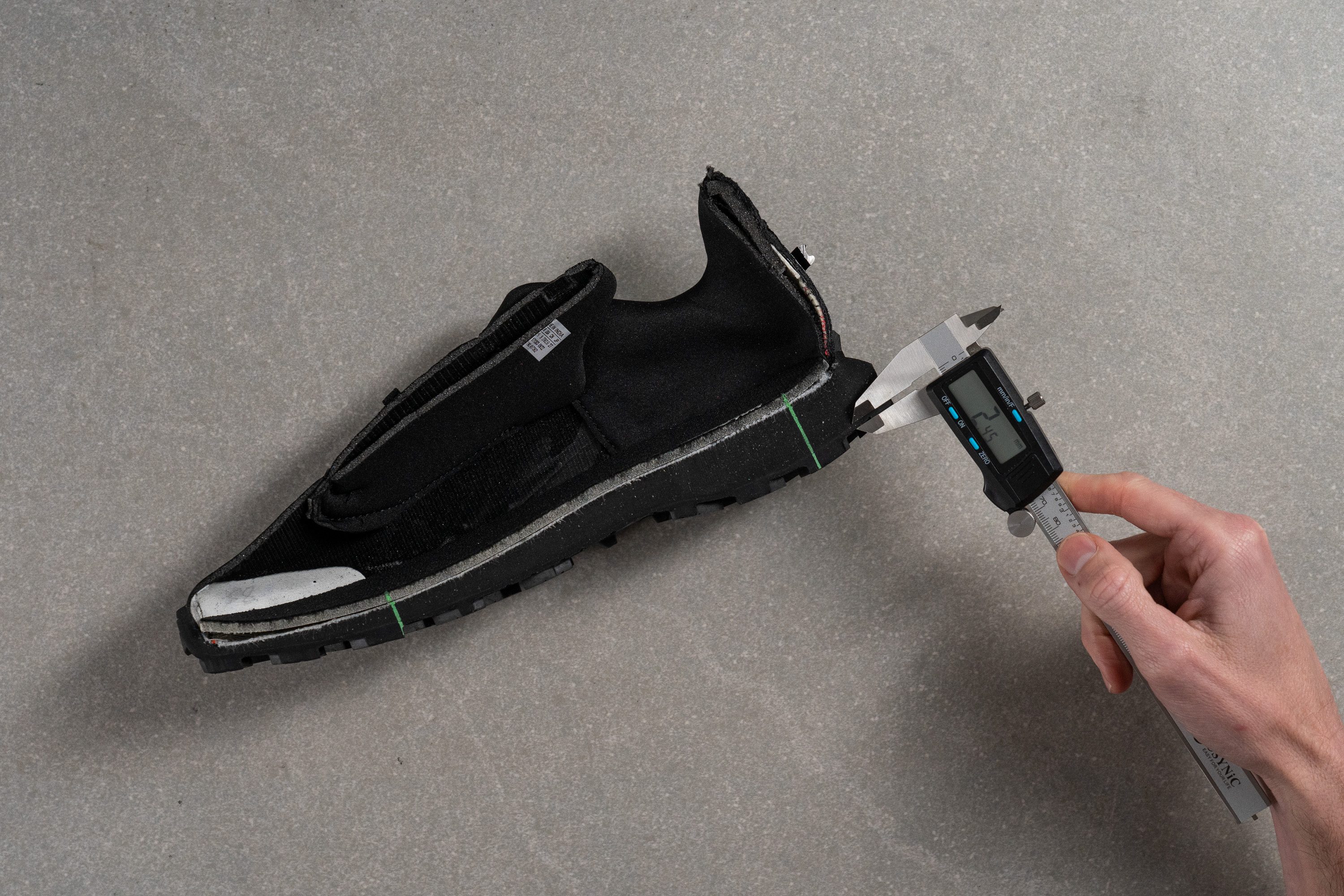
| Supercross 4 | 2.5 mm |
| Average | 2.2 mm |
Misc
Insole thickness
The insole measures a fairly standard 4.0 mm. However, it's worth mentioning that it's an Ortholite insole, which is a notable inclusion for a mid-range Salomon shoe, rather than a top-tier model.
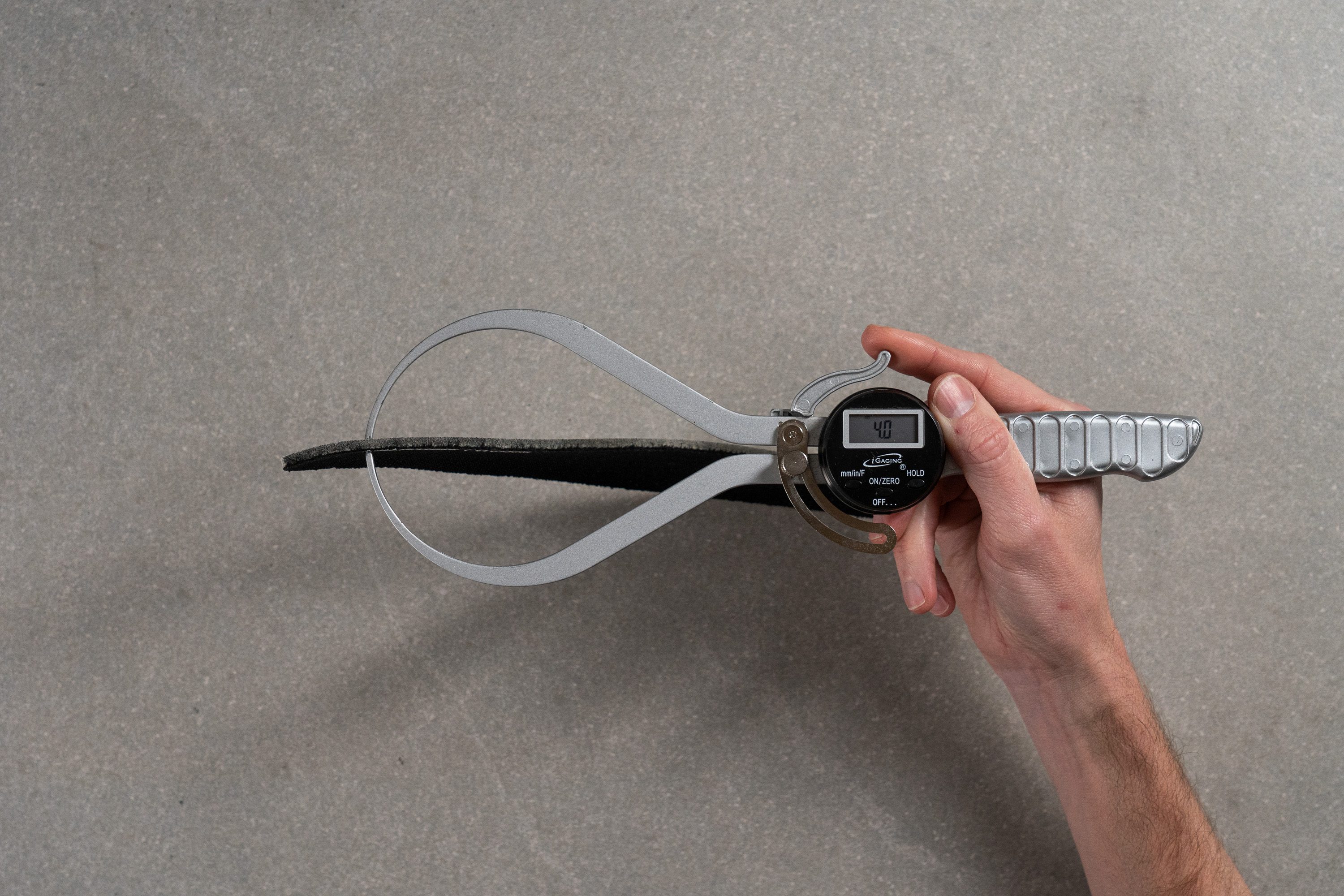
| Supercross 4 | 4.0 mm |
| Average | 4.7 mm |
Removable insole
The insole in the Supercross 4 is removable, allowing for easy replacement if necessary. Bear in mind that not all Salomon shoes allow for this possibility.
Also, as previously mentioned, the insole it's made by Ortholite, an American brand known for its eco-friendly and moisture-wicking insoles.
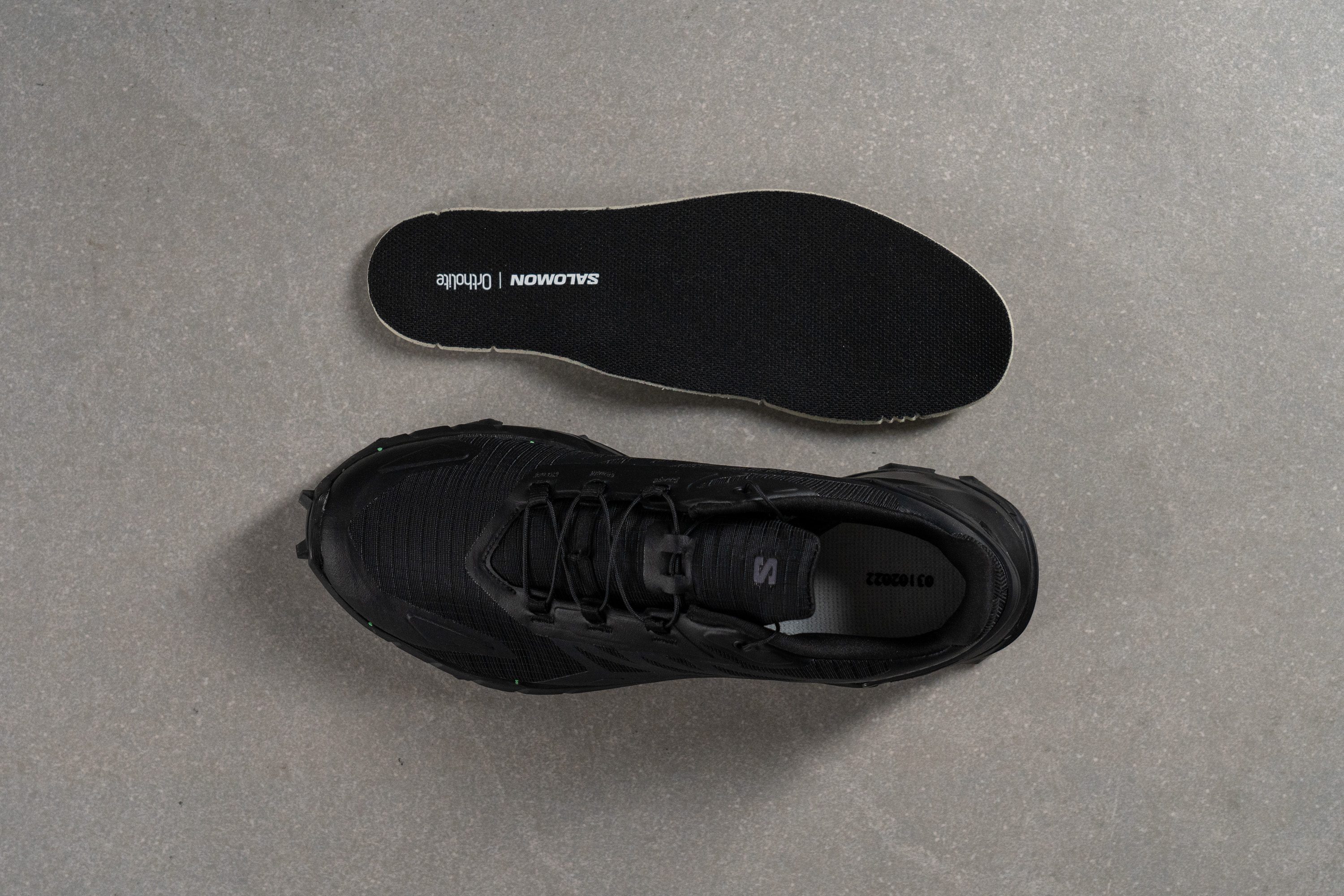
| Supercross 4 | Yes |
Midsole softness in cold
To gauge the shoe's performance in cold temperatures, we placed it in our freezer for 20 minutes, then conducted our standard procedure of four consecutive durometer tests for accuracy.
Post-freezing, the shoe registered at 23.6 HA.
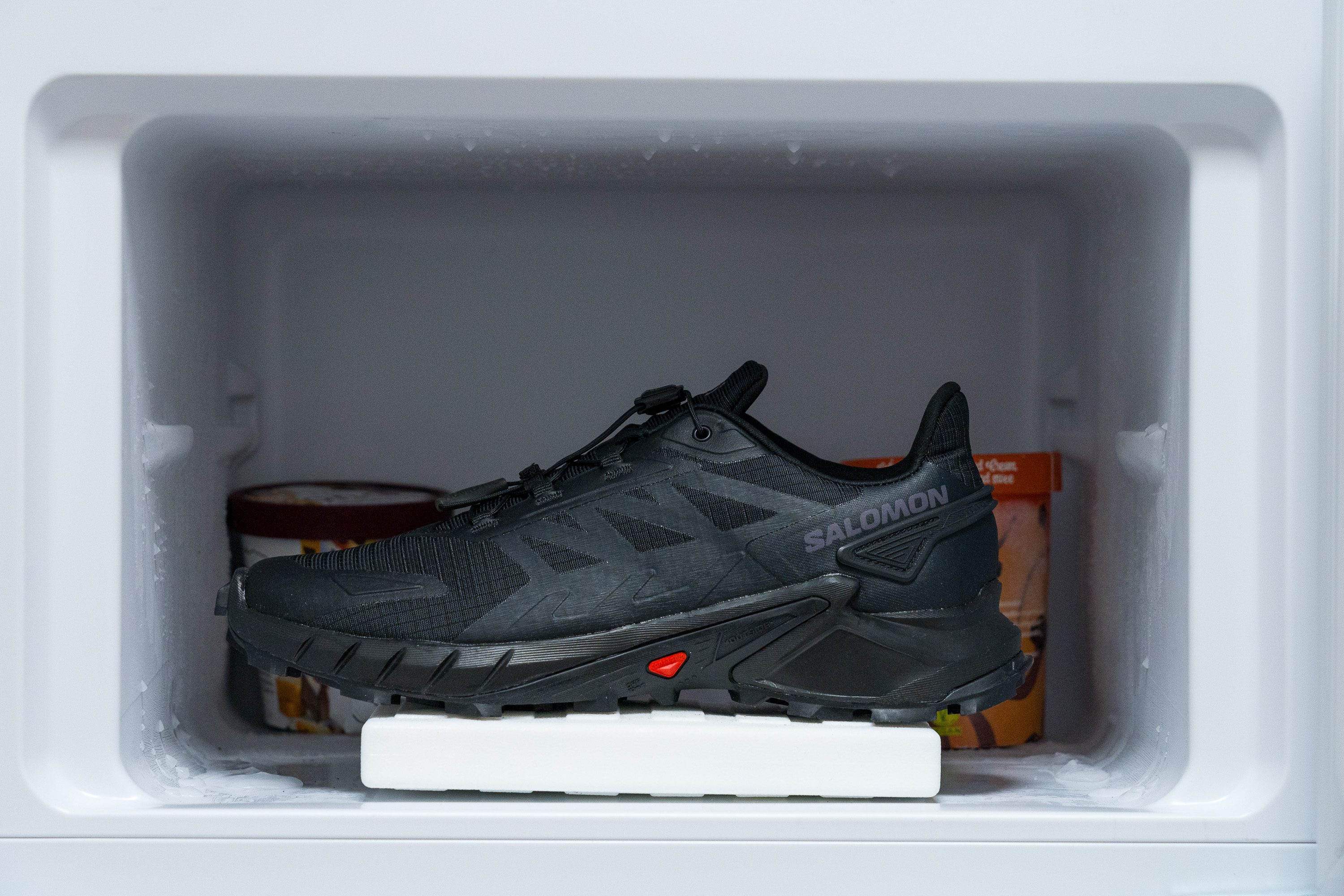
| Supercross 4 | 23.6 HA |
| Average | 27.4 HA |
Midsole softness in cold (%)
With only a 22.6% increase, it's clear that the shoe maintains its feel, ensuring that winter runs won't pose any significant changes in cushioning.
| Supercross 4 | 23% |
| Average | 26% |
Reflective elements
We didn't expected this one. Salomon chose to forgo reflective elements in a shoe designed for adventures.

| Supercross 4 | No |
Tongue padding
The tongue of the Supercross 4, measuring 7.0 mm, offers ample padding—perhaps a tad more than necessary given the shoe's weight.
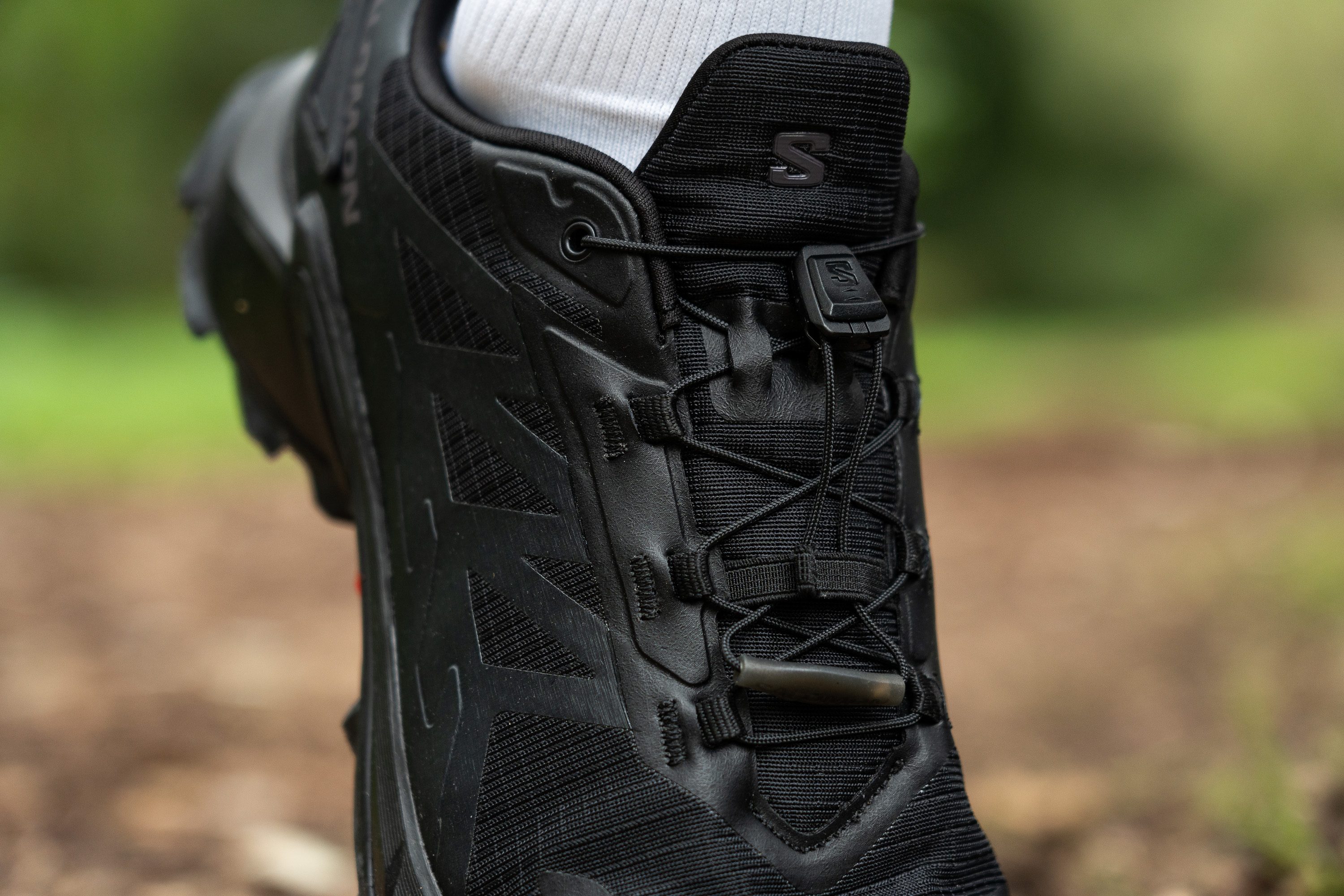
Nonetheless, this thickness means excellent news for those who often experience discomfort in the instep area, as it ensures added comfort.
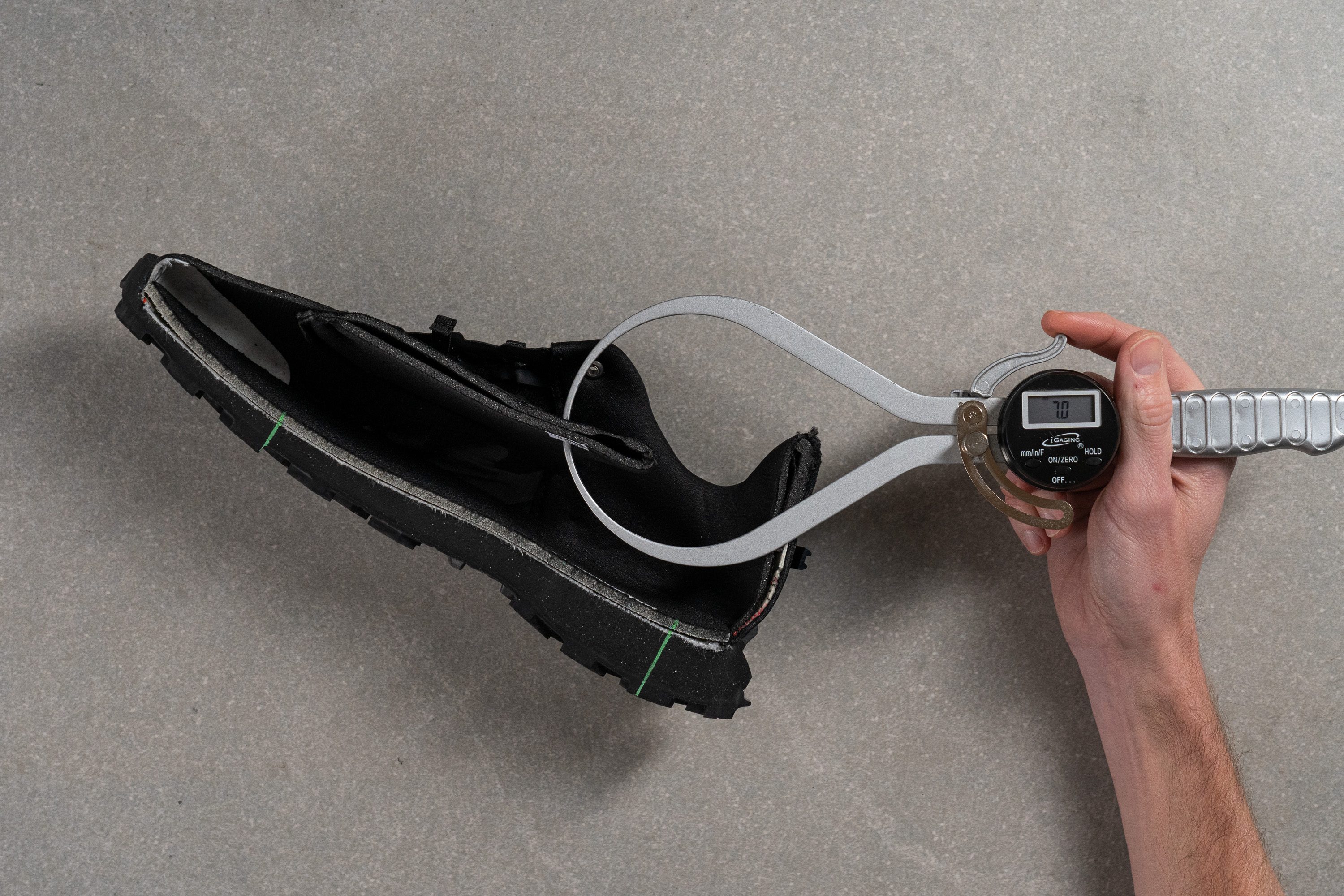
| Supercross 4 | 7.0 mm |
| Average | 6.4 mm |
Tongue: gusset type
The absence of a gusseted tongue in the Supercross 4 is disappointing, especially for a trail running shoe. But it's important to remember, this isn't a high-end model for Salomon, so some premium elements might be missing.
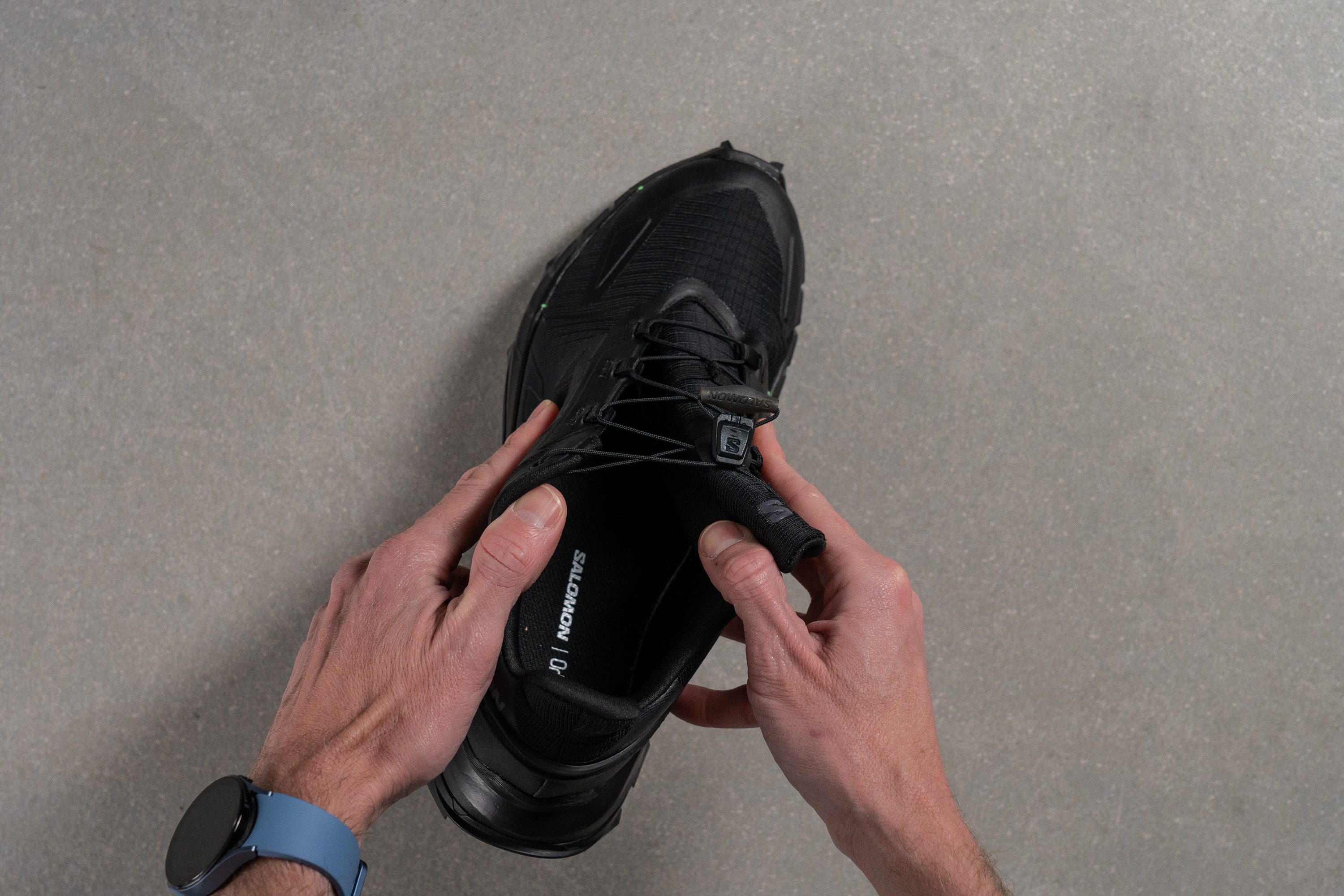
| Supercross 4 | None |
Heel tab
The Supercross 4 features a handy pull tab in the Achilles area, making it a breeze to slip your feet into the shoe.
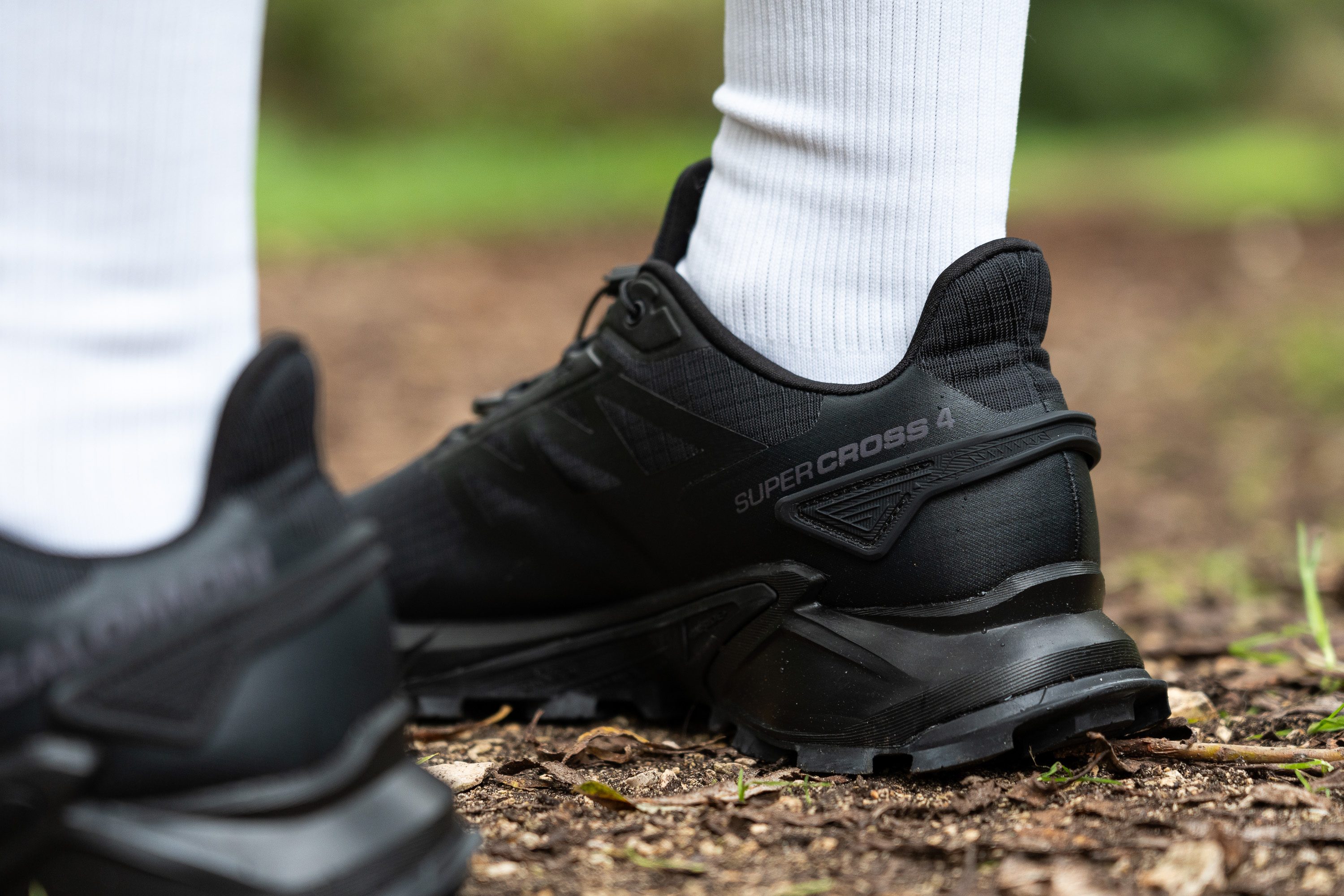
| Supercross 4 | Pull tab |

